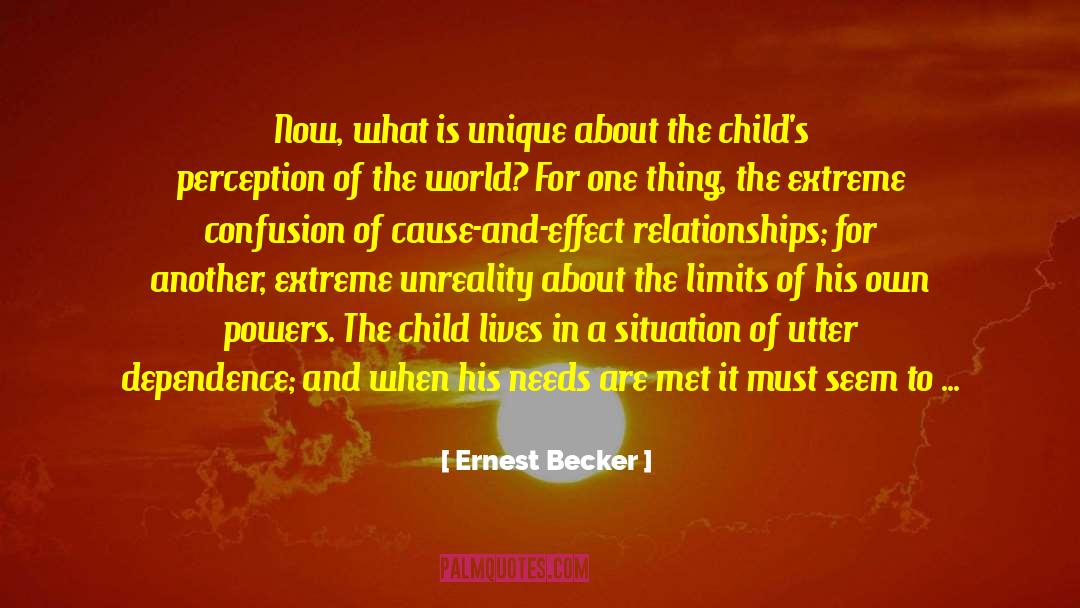Ernest Becker Famous Quotes
Reading Ernest Becker quotes, download and share images of famous quotes by Ernest Becker. Righ click to see or save pictures of Ernest Becker quotes that you can use as your wallpaper for free.
The personality can truly begin to emerge in religion because God, as an abstraction, does not oppose the individual as others do, but instead provides the individual with all the powers necessary for independent self-justification. What greater security than to lean confidently on God, on the Fount of creation, the most terrifying power of all? If God is hidden and intangible, all the better: that allows man to expand and develop by himself.
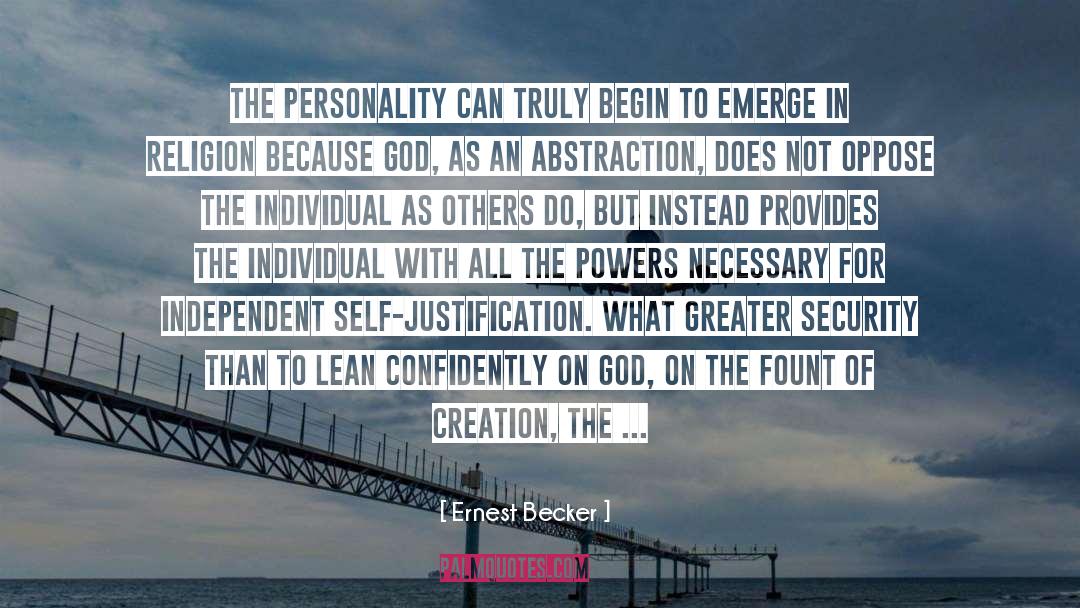
The key to the creative type is that he is separated out of the common pool of shared meanings. There is something in his life experience that makes him take in the world as a problem; as a result he has to make personal sense out of it.
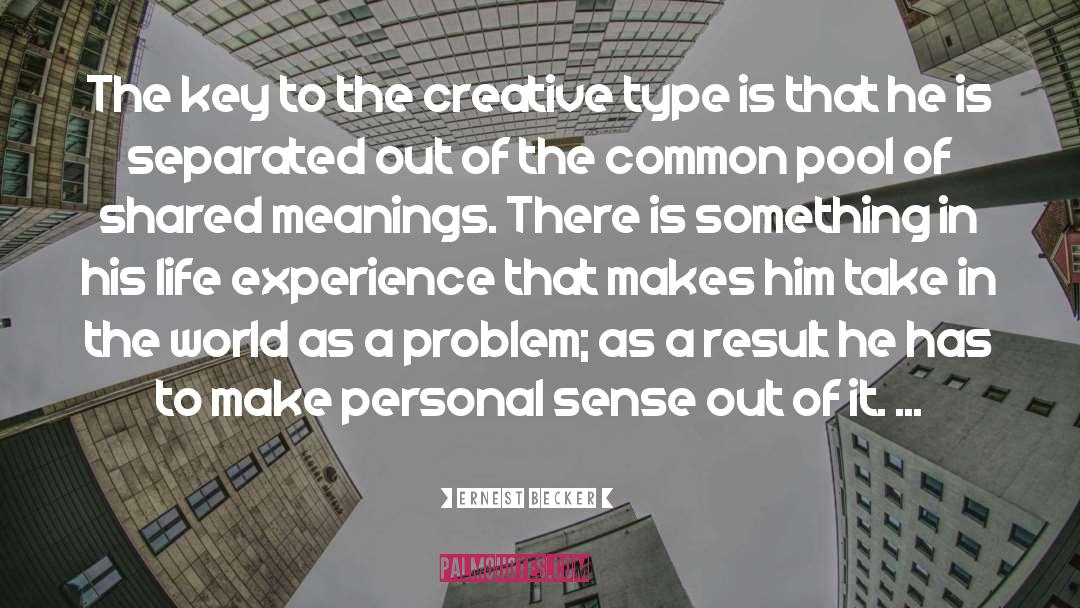
Once you base your whole life striving on a desperate lie, and try to implement that lie, you instrument your own undoing.

Better guilt than the terrible burden of freedom and responsibility.

There is no point in lingering on the fallacies of the revolutionaries of unrepression; one could go on and on, but everything would come back to the same basic thing: the impossibility of living without repression.
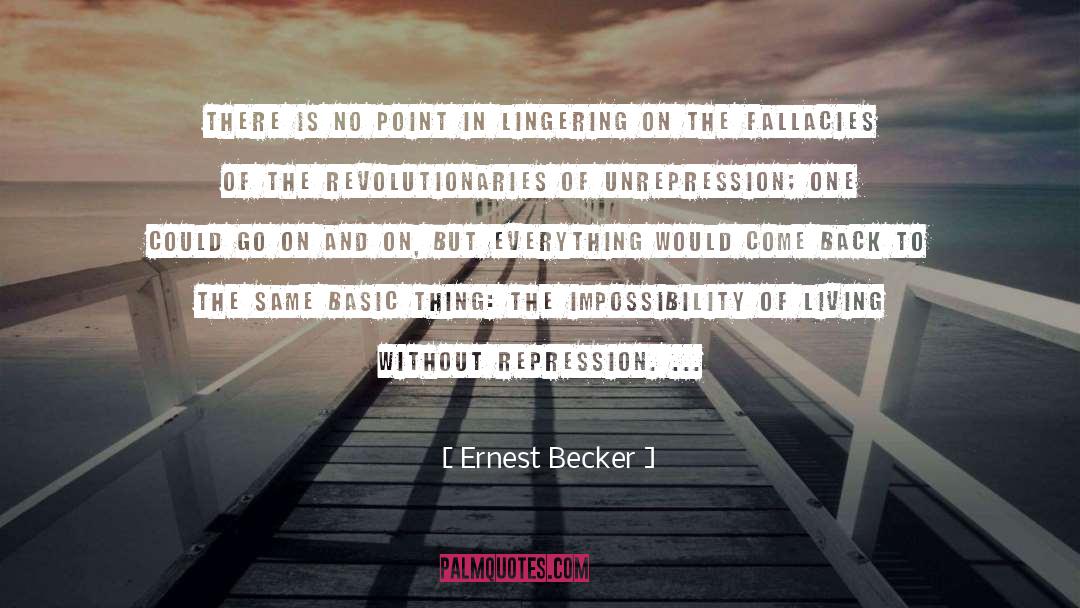
neurosis as a problem of character and have seen that it can be approached in two ways: as a problem of too much narrowness toward the world or of too much openness.
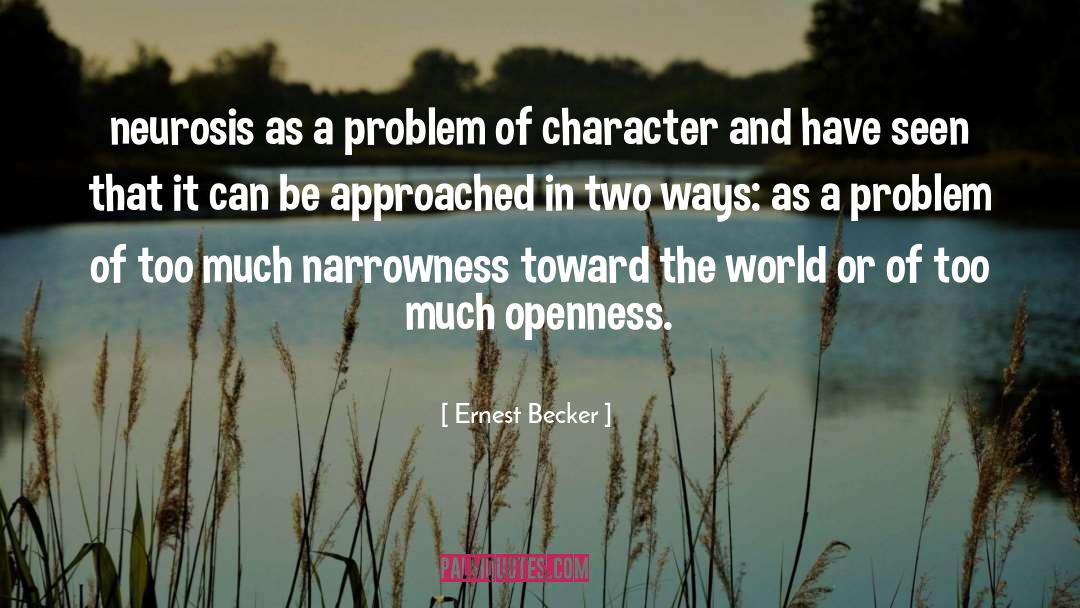
The neurotic exhausts himself not only in self-preoccupations like hypochondrial fears and all sorts of fantasies, but also in others: those around him on whom he is dependent become his therapeutic work project; he takes out his subjective problems on them. But people are not clay to be molded; they have needs and counter-wills of their own. The neurotic's frustration as a failed artist can't be remedied by anything but an objective creative work of his own. Another way of looking at it is to say that the more totally one takes in the world as a problem, the more inferior or "bad" one is going to feel inside oneself. He can try to work out this "badness" by striving for perfection, and then the neurotic symptom becomes his "creative" work; or he can try to make himself perfect by means his partner. But it is obvious to us that the only way to work on perfection is in the form of an objective work that is fully under your control and is perfectible in some real ways. Either you eat up yourself and others around you, trying for perfection; or you objectify that imperfection in a work, on which you then unleash your creative powers. In this sense, some kind of objective creativity is the only answer man has to the problem of life. In this way he satisfies nature, which asks that he live and act objectively as a vital animal plunging into the world; but he also satisfies his own distinctive human nature because he plunges in on his own symbolic terms and not as a reflex of the w
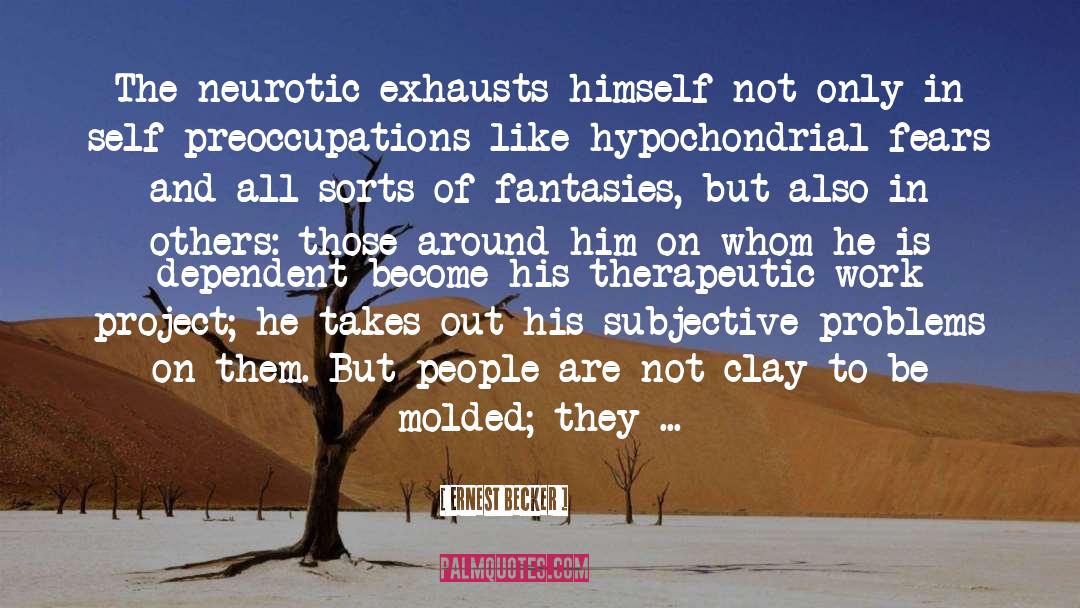
The ironic thing about the narrowing-down of neurosis is that the person seeks to avoid death, but he does it by killing off so much of himself and so large a spectrum of his action-world that he is actually isolating and diminishing himself and becomes as though dead.10 There is just no way for the living creature to avoid life and death, and it is probably poetic justice that if he tries too hard to do so he destroys himself.

Sartre has called man a "useless passion" because he is so hopelessly bungled, so deluded about his true condition. He wants to be a god with only the equipment of an animal, and so he thrives on fantasies. As Ortega so well put it in the epigraph we have used for this chapter, man uses his ideas for the defense of his existence, to frighten away reality. This is a serious game, the defense of one's existence-how take it away from people and leave them joyous?
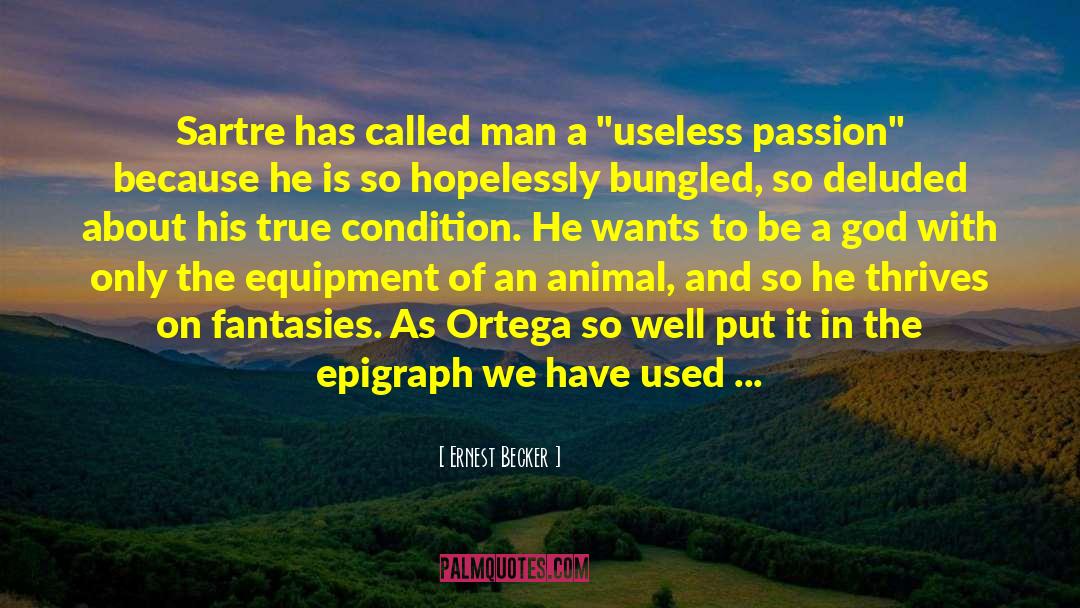
This is the terror: to have emerged from nothing, to have a name, consciousness of self, deep inner feelings, an excruciating inner yearning for life and self-expression - and with all this yet to die.
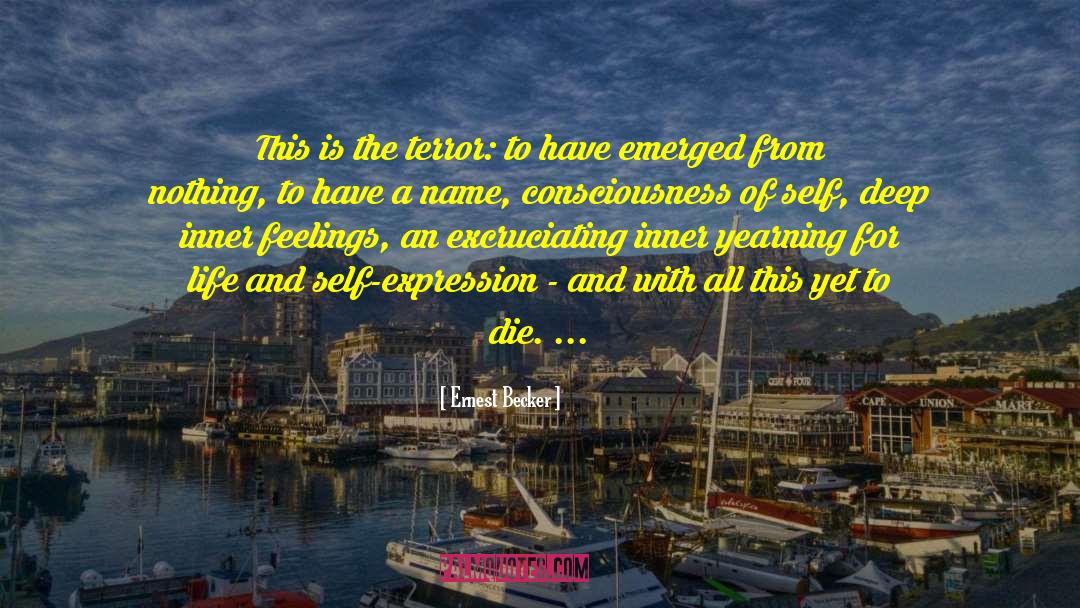
Man is literally split in two: he has an awareness of his own splendid uniqueness in that he sticks out of nature with a towering majesty, and yet he goes back into the ground a few feet in order blindly and dumbly to rot and disappear forever.
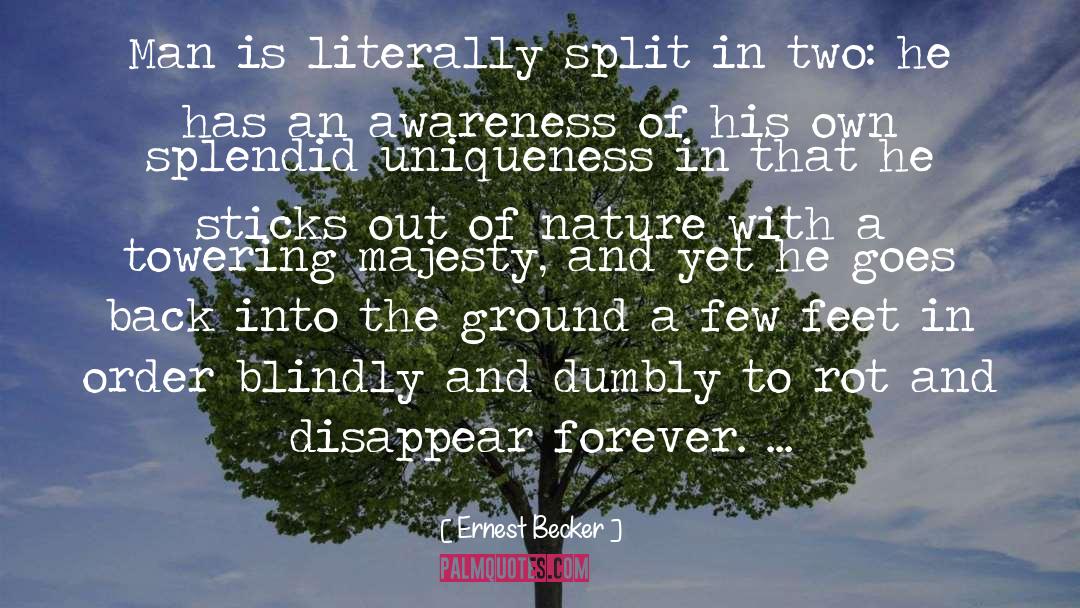
For man, maximum excitement is the confrontation of death and the skillful defiance of it by watching others fed to it as he survives transfixed with rapture.

Genuine heroism for man is still the power to support contradictions, no matter how glaring or hopeless they may seem.

If a thinker throws off too many unsystematic and rich insights, there is no place to grab onto his thought. The thing he is trying to illuminate seems as elusive as before.
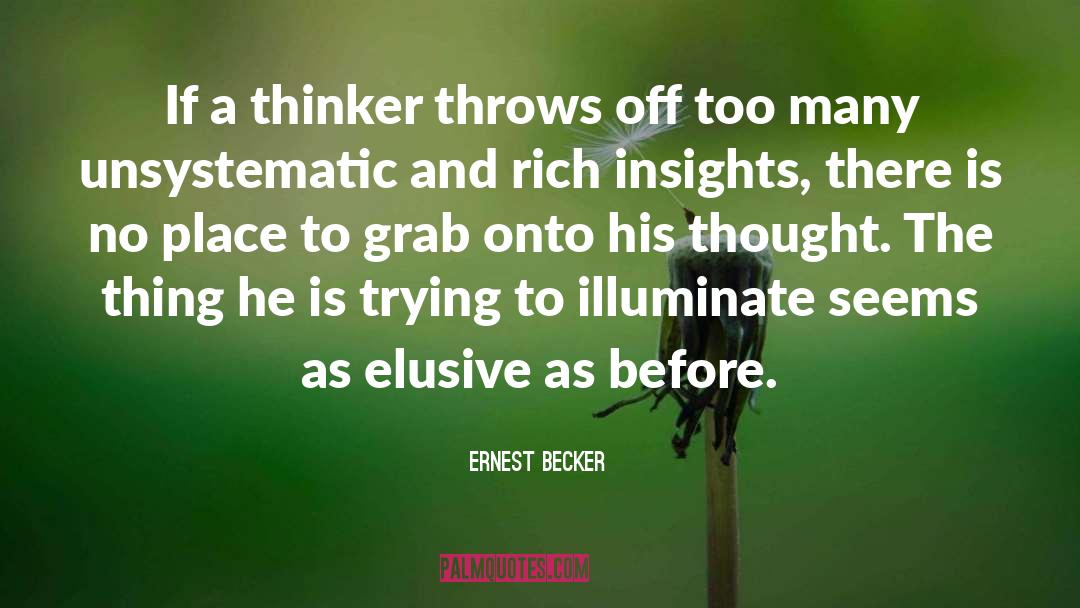
The idea of death, the fear of it, haunts the human animal like nothing else.

Obviously, all religions fall far short of their own ideals.

Men use one another to assure their personal victory over death.

By the time we grow up we become masters at dissimulation, at cultivating a self that the world cannot probe. But we pay a price. After years of turning people away, of protecting our inner self, of cultivating it by living in a different world, of furnishing this world with our fantasies and dreams - lo and behold we find that we are hopelessly separated from everyone else. We have become victims of our own art. We touch people on the outsides of their bodies, and they us, but we cannot get at their insides and cannot reveal our insides to them. This is one of the great tragedies of our interiority - it is utterly personal and unrevealable. Often we want to say something unusually intimate to a spouse, a parent, a friend, communicate something of how we are really feeling about a sunset, who we really feel we are - only to fall strangely and miserably flat. Once in a great while we succeed, sometimes more with one person, less or never with others. But the occasional break-through only proves the rule. You reach out with a disclosure, fail, and fall back bitterly into yourself. We emit huge globs of love to our parents and spouses, and the glob slithers away in exchange of words that are somehow beside the point of what we are trying to say. People seem to keep bumping up against each other with their exteriors and falling away from each other. The cartoonist Jules Feiffer is the modern master of this aspect of the human tragedy. Take even the sexual act - the most intimate

We don't want to admit that we do not stand alone, that we always rely on something that transcends us, some system of ideas and powers in which we are embedded and which support us. This power is not always obvious. It need not be overtly a god or openly a stronger person, but it can be the power of an all-absorbing activity, a passion, a dedication to a game, a way of life, that like a comfortable web keeps a person buoyed up and ignorant of himself, of the fact that he does not rest on his own center. All of us are driven to be supported in a self-forgetful way, ignorant of what energies we really draw on, of the kind of lie we have fashioned in order to live securely and serenely. Augustine was a master analyst of this, as were Kierkegaard, Scheler, and Tillich in our day. They saw that man could strut and boast all he wanted, but that he really drew his "courage to be" from a god, a string of sexual conquests, a Big Brother, a flag, the proletariat, and the fetish of money and the size of a bank balance.
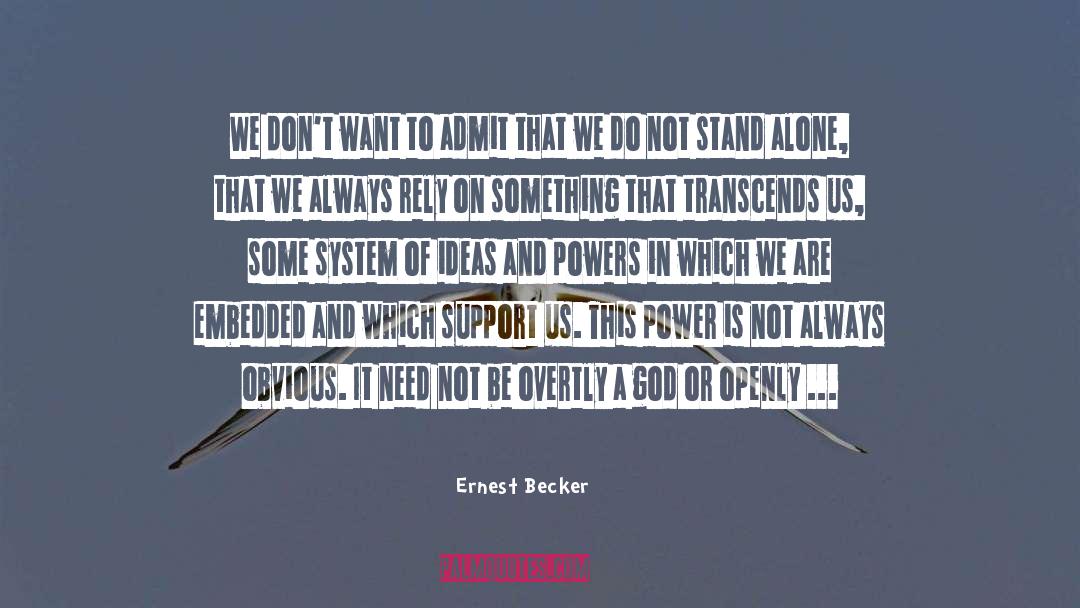
We called one's lifestyle a vital lie, and now we can understand better why we said it was vital: it is a necessary and basic dishonesty about oneself and one's whole situation ... We don't want to admit that we are fundamentally dishonest about reality, that we do not really control our own lives.
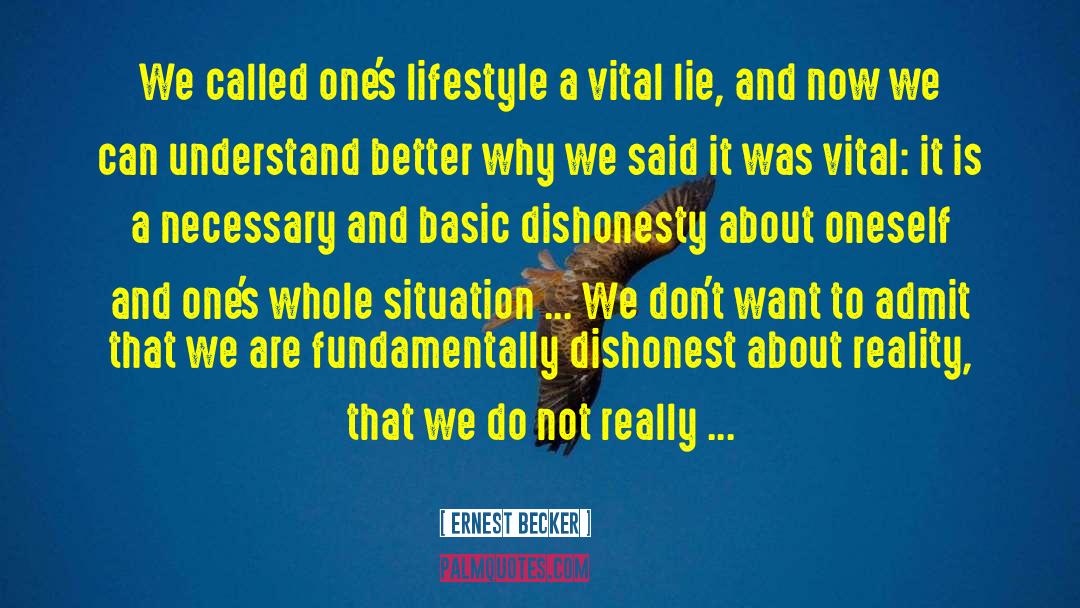
The man of knowledge in our time is bowed down under a burden he never imagined he would ever have: the overproduction of truth that cannot be consumed.
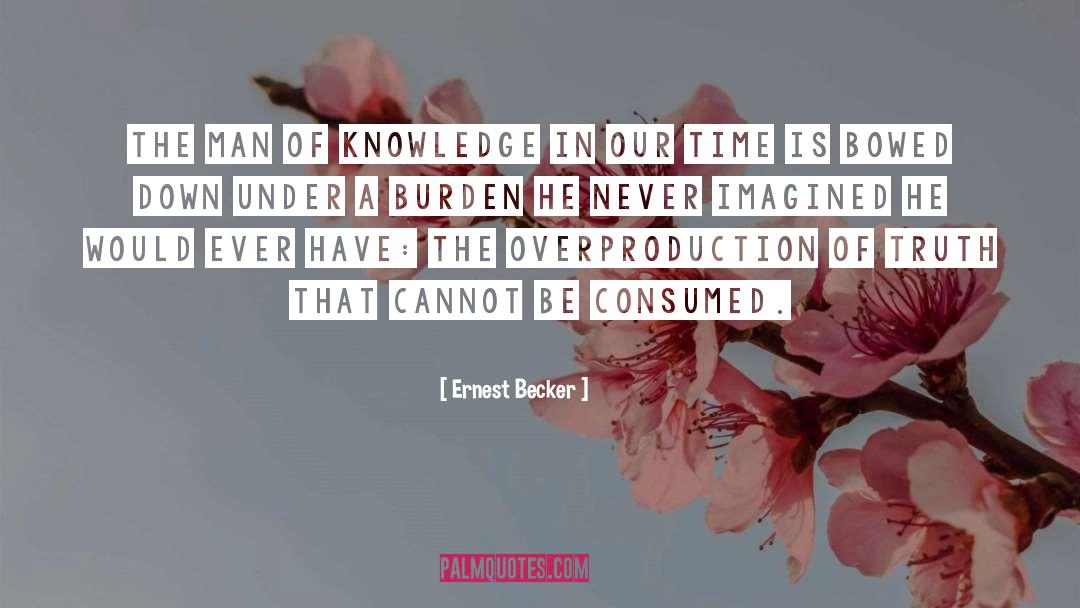
I have reached far beyond my competence and have probably secured for good a reputation for flamboyant gestures. But the times still crowd me and give me no rest, and I see no way to avoid ambitious synthetic attempts; either we get some kind of grip on the accumulation of thought or we continue to wallow helplessly, to starve amidst plenty. So I gamble with science and write.

the human condition is just too much for an animal to take; it is overwhelming.

In Jung's terms-that we noted previously-the work is the artist's own transference projection, and he knows that consciously and critically. Whatever he does he is stuck with himself, can't get securely outside and beyond himself. He is also stuck with the work of art itself. Like any material achievement it is visible, earthly, impermanent. No matter how great it is, it still pales in some ways next to the transcending majesty of nature; and so it is ambiguous, hardly a solid immortality symbol. In his greatest genius man is still mocked. No matter that historically art and psychosis have had such an intimate relationship, that the road to creativity passes so close to the madhouse and often detours or ends there. The artist and the madman are trapped by their own fabrications; they wallow in their own anality, in their protest that they really are something special in creation.
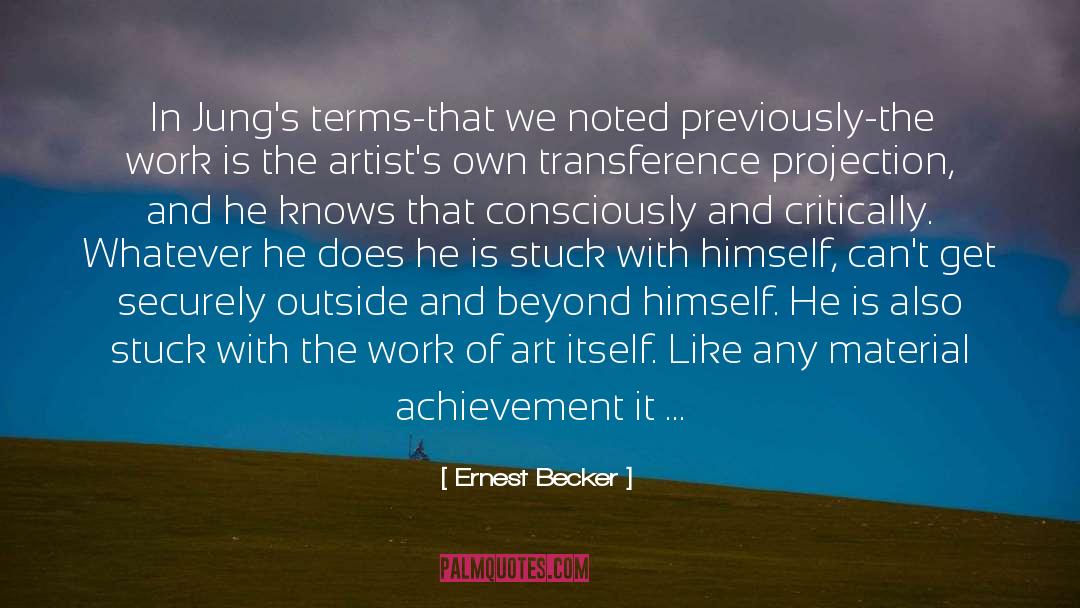
The body, then, is one's animal fate that has to be struggled against in some ways. At the same time, it offers experiences and sensations, concrete pleasure that the inner symbolic world lacks. No wonder man is impaled on the horns of sexual problems, why Freud saw that sex was so prominent in human life-especially in the neurotic conflicts of his patients. Sex is an inevitable component of man's confusion over the meaning of his life, a meaning split hopelessly into two realms-symbols (freedom) and body (fate). No wonder, too, that most of us never abandon entirely the early attempts of the child to use the body and its appendages as a fortress or a machine to magically coerce the world. We try to get metaphysical answers out of the body that the body-as a material thing-cannot possibly give. We try to answer the transcendent mystery of creation by experiences in one, partial, physical product of that creation. This is why the mystique of sex is so widely practiced-say, in traditional France-and at the same time is so disillusioning. It is comfortingly infantile in its indulgence and its pleasure, yet so self-defeating of real awareness and growth, if the person is using it to try to answer metaphysical questions. It then becomes a lie about reality, a screen against full consciousness. If the adult reduces the problem of life to the area of sexuality, he repeats the fetishization of the child who focuses the problem of the mother upon her genitals. Sex then becomes a scree
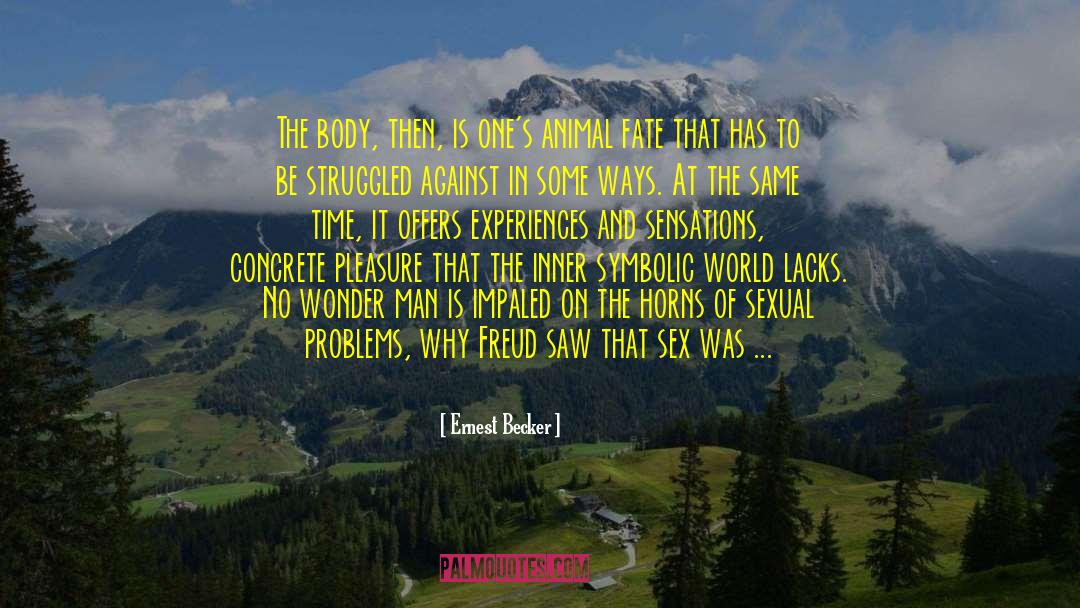
People use their leaders almost as an excuse. When they give in to the leader's commands they can always reserve the feeling that these commands are are alien to them, that they are the leader's responsibility, that the terrible acts they are committing are in his name and not theirs. This, then, is another thing that makes people feel so guiltless, as Canetti points out: they can imagine themselves as temporary victims of the leader. The more they give in to his spell, and the more terrible the crimes they commit, the more they can feel that the wrongs are not natural to them. It is all so neat, this usage of the leader; it reminds us of James Franzer's discovery that in the remote past tribes often used their kings as scapegoats who, when they no longer served the people's needs, were put to death. These are the many ways in which men can play the hero, all the while that they are avoiding responsibility for their own acts in a cowardly way.

One of the main reasons that it is so easy to march men off to war is that each of them feels sorry for the man next to him who will die.

Man cannot endure his own littleness unless he can translate it into meaningfulness on the largest possible level.

We cannot repeat too often the great lesson of freudian psychology: that repression is normal self-protection and creative self-restriction-in a real sense, man's natural substitute for instinct. Rank has a perfect, key term for this natural human talent: he calls it "partialization" and very rightly sees that life is impossible without it. What we call the well-adjusted man has just this capacity to partialize the world for comfortable action. I have used the term "fetishization," which is exactly the same idea: the "normal" man bites off what he can chew and digest of life, and no more. In other words, men aren't built to be gods, to take in the whole world; they are built like other creatures, to take in the piece of ground in front of their noses. Gods can take in the whole of creation because they alone can make sense of it, know what it is all about and for. But as soon as a man lifts his nose from the ground and starts sniffing at eternal problems like life and death, the meaning of a rose or a star cluster-then he is in trouble. Most men spare themselves this trouble by keeping their minds on the small problems of their lives just as their society maps these problems out for them. These are what Kierkegaard called the "immediate" men and the "Philistines." They "tranquilize themselves with the trivial"- and so they can lead normal lives.
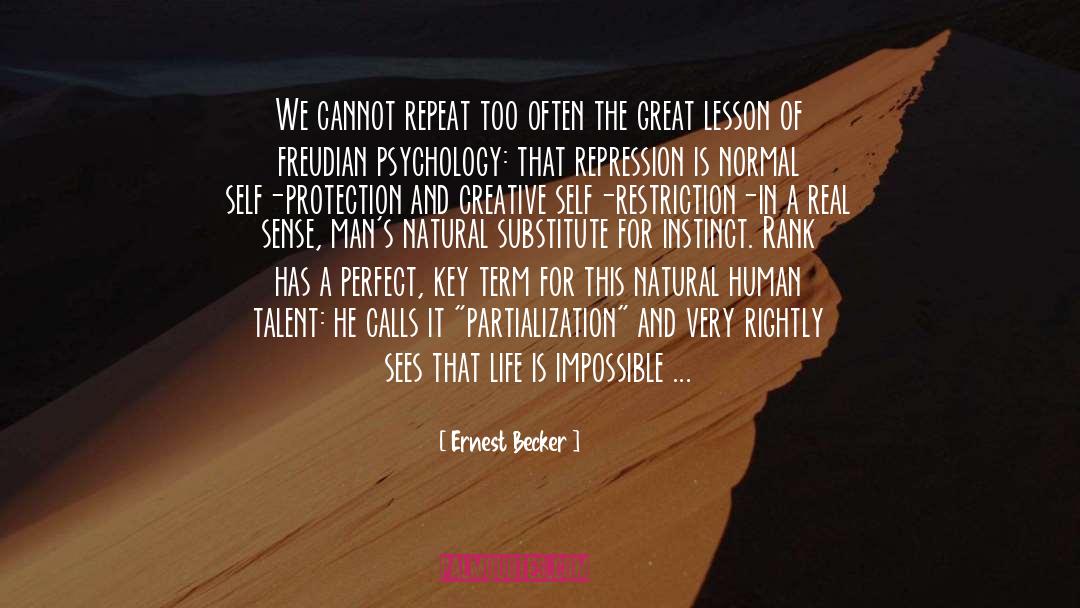
The most terrifying burden of the creature is to be isolated, which is what happens in individuation: one separates himself out of the herd. This move exposes the person to the sense of being completely crushed and annihilated because he sticks out so much, has to carry so much in himself. These are the risks when the person begins to fashion consciously and critically his own framework of heroic self-reference. Here is precisely the definition of the artist type, or the creative type generally. We have crossed a threshold into a new type of response to man's situation. No one has written about this type of human response more penetratingly than Rank; and of all his books, Art and Artist is the most secure monument to his genius. I
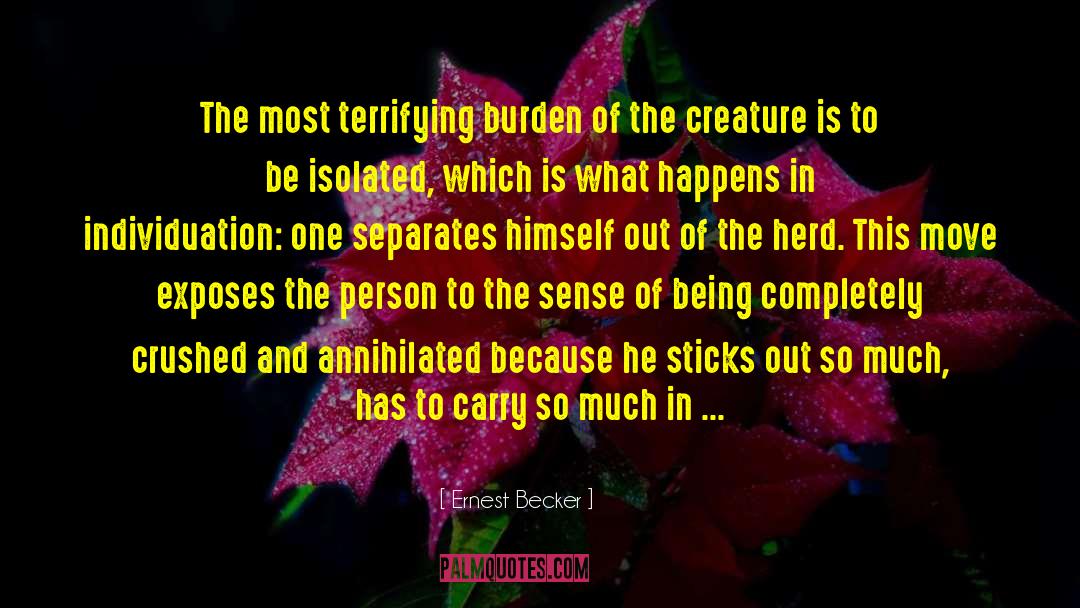
Psychology narrows the cause for personal unhappiness down to the person himself, and then he is stuck with himself. But we know that the universal and general cause for personal badness, guilt, and inferiority is the natural world and the person's relationship to it as a symbolic animal who must find a secure place in it. All the analysis in the world doesn't allow the person to find out who he is and why he is here on earth, why he has to die, and how he can make his life a triumph. It is when psychology pretends to do this, when it offers itself as a full explanation of human unhappiness, that it becomes a fraud that makes the situation of modern man on impasse from which he cannot escape.

The warding off of anxiety is central to the time-binding, action-delaying, and cerebral functions of the human animal.

Try repeating "man is an animal" a few times, just to notice how unconvincing it sounds. There seems to be no way to get this idea into our heads, except by long rumination over the facts of evolution or perhaps by exposure to a primitive tribe or by being raised on a farm. Primitives sometimes see little difference between themselves and the animals around them. Karl von den Steinen was told by a Xingu that the only difference between them and the monkey was that they monkeys lacked the bow and arrow. And Jules Henry observed on the Kningang that dogs are not considered pets, like some of the other animals, but are on a level of emotional equality, like a relative. But in our own Western culture we have, for the most part, set a great distance between ourselves and the rest of nature, and language helps us to do this. Thus we say that a sheep "drops" its lamb, but a woman "gives birth" - it's much more noble. Yet we have the right to make such distinctions because we assign the meaning to the world by naming names of things; we inhabit a different sphere and we capitalize naturally on the privilege.

In the head of the adoring male is the illusion that sublime beauty "is all head and wings, with no bottom to betray" it. In one of Swift's poems a young man explains the grotesque contradiction that is tearing him apart:
Nor wonder how I lost my Wits;
Oh! Caelia, Caelia, Caelia, shits!
In other words, in Swift's mind there was an absolute contradiction "between the state of being in love and an awareness of the excremental function of the beloved.

This penetrating vocabulary of "initiatory acts," "the infectiousness of the unconflicted person," "priority magic," and so on allows us to understand more subtly the dynamics of group sadism, the utter equanimity with which groups kill. It is not just that "father permits it" or "orders it." It is more: the magical heroic transformation of the world and of oneself. This is the illusion that man craves, as Freud said, and that makes the central person so effective a vehicle for group emotion.
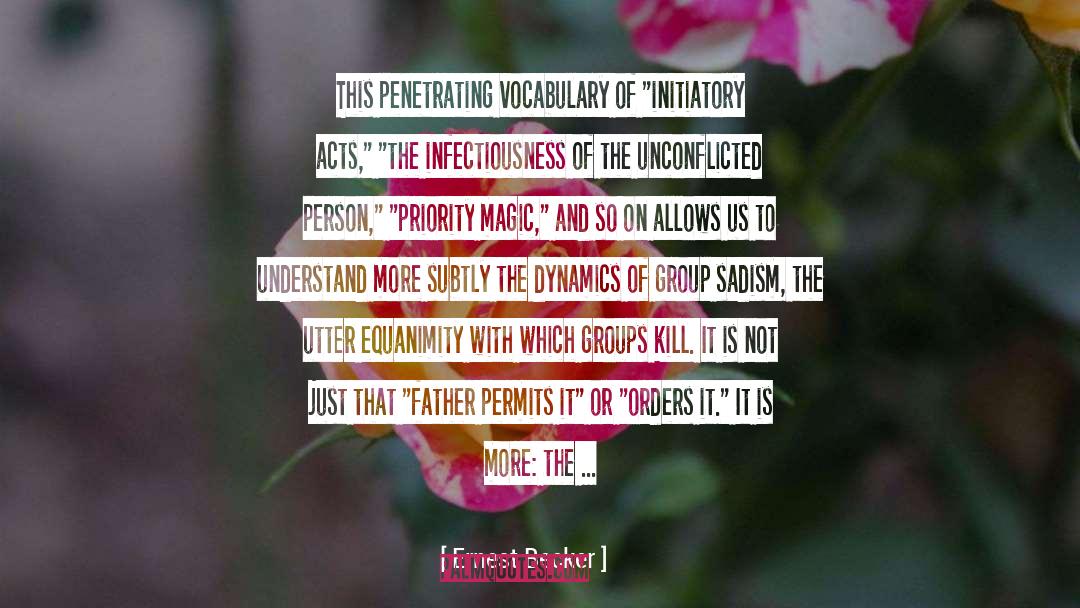
People were always ready to yield their
wills, to worship the hero, because they were not given a chance
for developing initiative, stability, and independence, said the great
nineteenth-century Russian sociologist Nikolai Mikhailovsky

Consider, for instance, the recent war in Vietnam in which the United States was driven not by any realistic economic or political interest but by the overwhelming need to defeat atheistic communism.

And so, beginning with the small early frustrations and deprivations, the child is helped to govern himself. his ego develops by learning to regulate his own food intake and feces evacuation: he has to learn to adapt to a social schedule, to an external measure of time, in place of a biological schedule of internal urges. In all this he makes a bitter discovery: that he is no longer himself, just by seeking pleasure. There may be more excitement in the world but the fun keep getting interrupted. For some strange reason the mother doesn't share his glee over a bowel movement on the sofa. The child finds that he has to "earn" the mother's love by performing in a certain way. He comes to realize that he has to abandon the idea of "total excitement" and "uninterrupted fun," if he wants to keep a secure background of love from the mother. This is what Alfred Adler meant when he spoke of the child's need for affection as the "lever" of his education. The child learns to accept frustrations so long as the total relationship is not endangered. This is what the psychoanalytic word "ambivalence" so nicely covers: the child may hesitate between giving up what has previously been an assured satisfaction, and proceeding to a new type of conduct which will be rewarded by a new kind of acceptance. Does he want to keep the breast instead of switching to the bottle? He finds that if he makes this switch he gets a special cooing of praise and a little extra attention. Ambivalence describes the

Creation is a nightmare spectacular taking place on a planet that has been soaked for hundreds of millions of years in the blood of all its creatures.
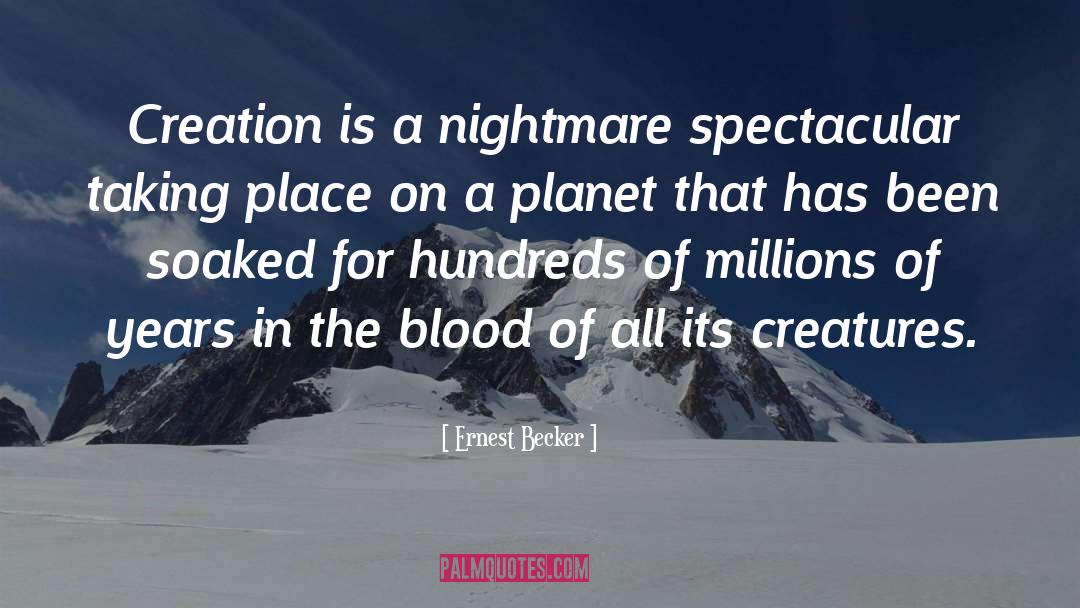
Generally speaking, we call neurotic any life style that begins to constrict too much, that prevents free forward momentum, new choices, and growth that a person may want and need. For example, a person who is trying to find his salvation only in a love relationship but who is being defeated by this too narrow focus is neurotic. He can become overly passive and dependent, fearful of venturing out on his own, of making his life without his partner, no matter how that partner treats him. The object has become his "All," his whole world; and he is reduced to the status of a simple reflex of another human being.
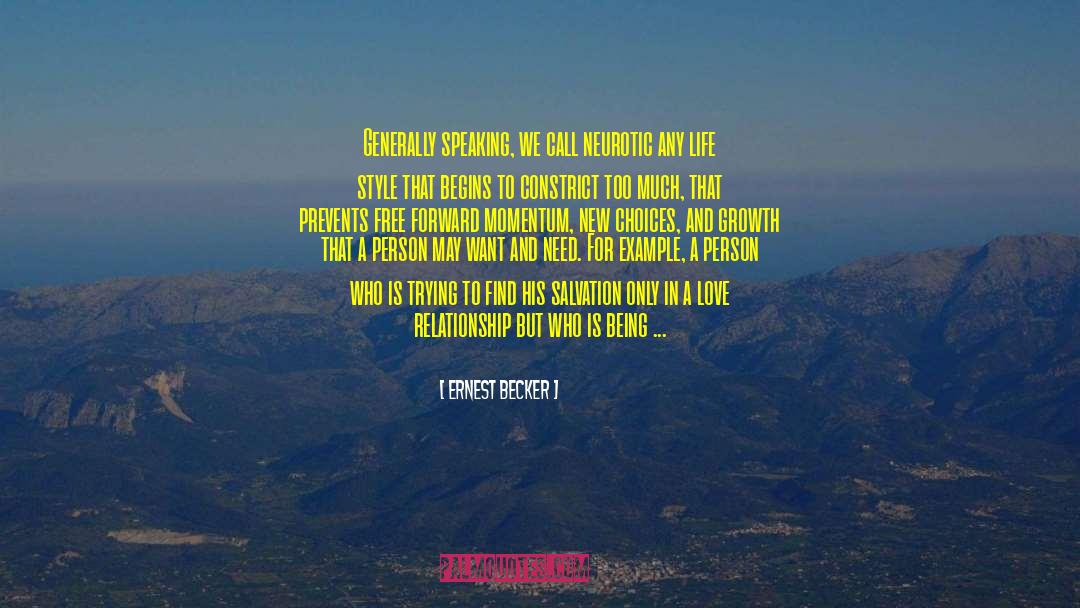
Beyond a given point man is not helped by more "knowing," but only by living and doing in a partly self-forgetful way. As Goethe put it, we must plunge into experience and then reflect on the meaning of it. All reflection and no plunging drives us mad; all plunging and no reflection, and we are brutes.
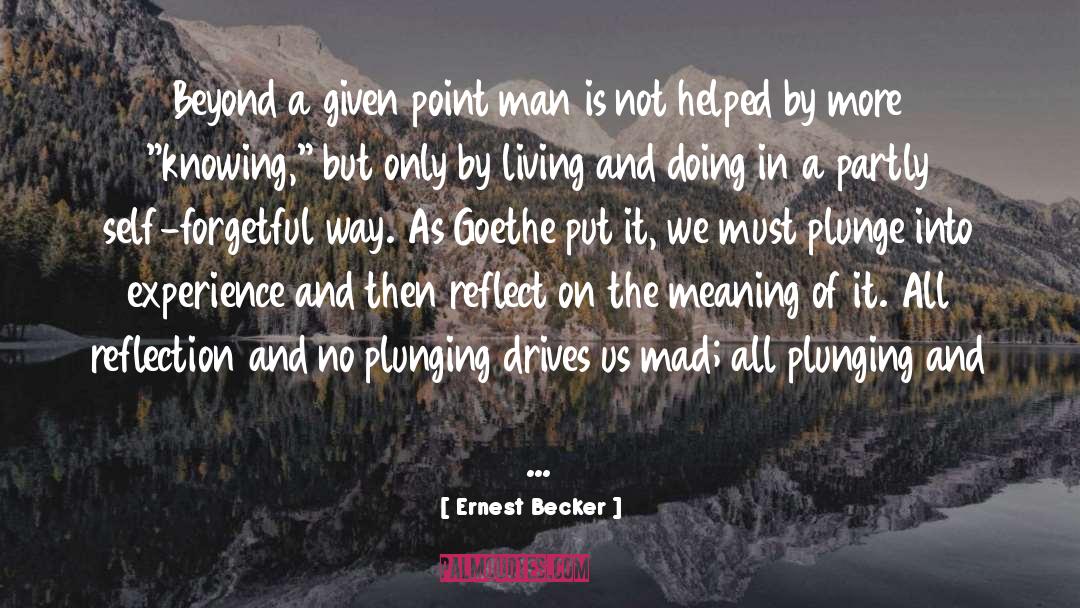
Even if men admit they are cowards, they still want to be saved. There is no "harmonious development," no child-rearing program, no self-reliance that would take away from men their need for a "beyond" on which to base the meaning of their lives.
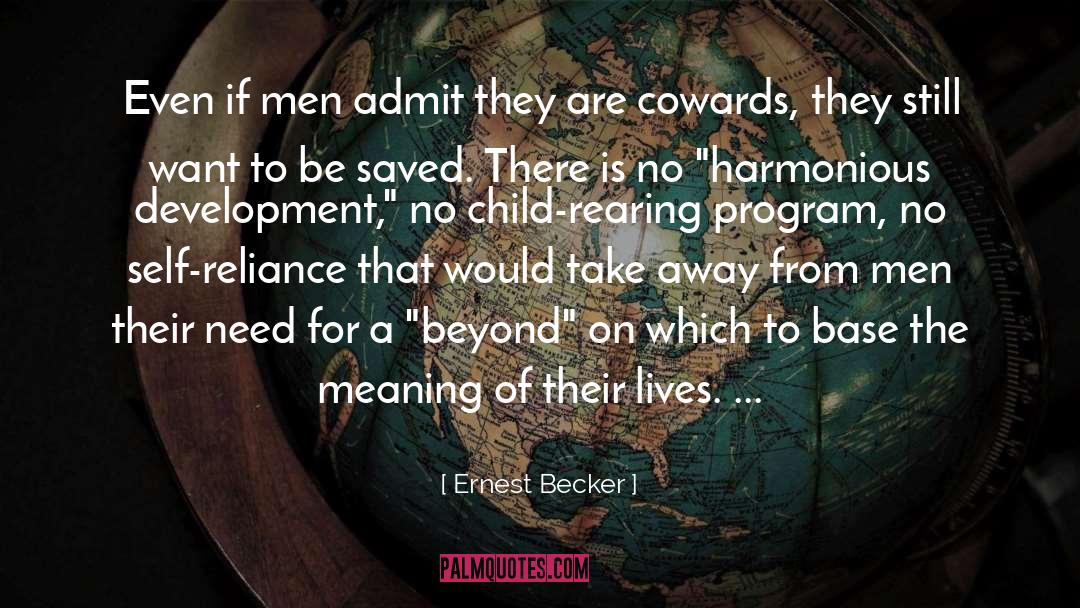
And so we see the paradox that evolution has handed us. If man is the only animal whose consciousness of self gives him an unusual dignity in the animal kingdom, he also pays a tragic price for it. The fact that the child has to identify -first- means that his very first identity is a social product. His habitation of his own body is built from the outside in; not from the inside out. He doesn't unfold into the world, the world unfolds into him. As the child responds to the vocal symbols learned from his object, he often gives the pathetic impression of being a true social puppet, jerked by alien symbols and sounds. What sensitive parent does not have his satisfaction tinged with sadness as the child repeats with such vital earnestness the little symbols that are taught him?
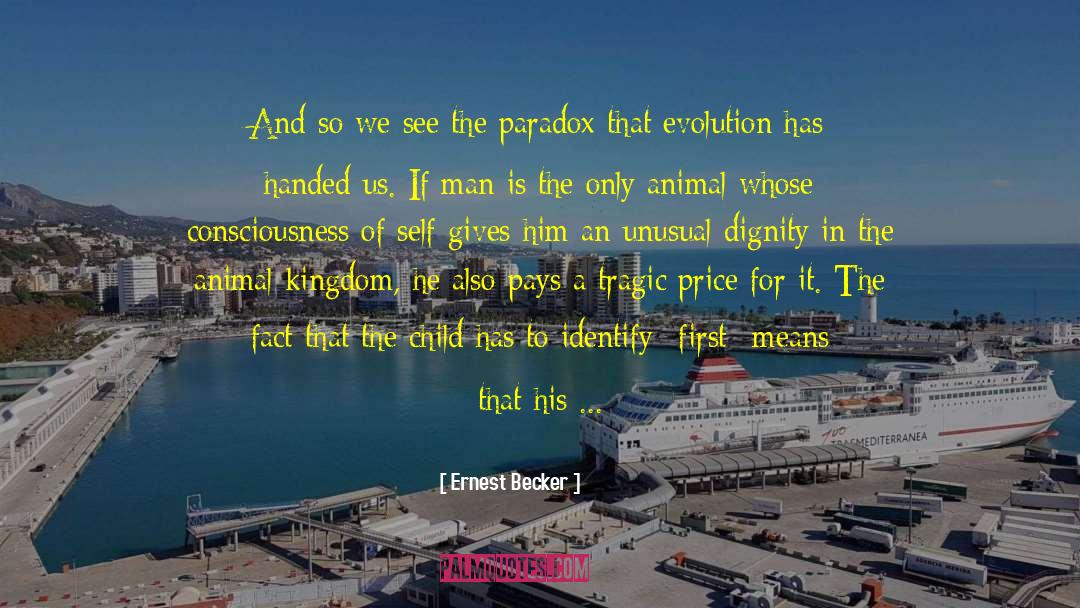
To live fully is to live with an awareness of the rumble of terror that underlies everything.

In this view, man is an energy-converting
organism who must exert his manipulative powers, who must damage his world in some ways, who must make it uncomfortable for others, etc., by his own nature as an active being. He seeks self-expansion
from a very uncertain power base. Even if man hurts
others, it is because he is weak and afraid, not because he is confident and cruel. Rousseau summed up this point of view with the idea that only the strong person can be ethical, not the weak one.
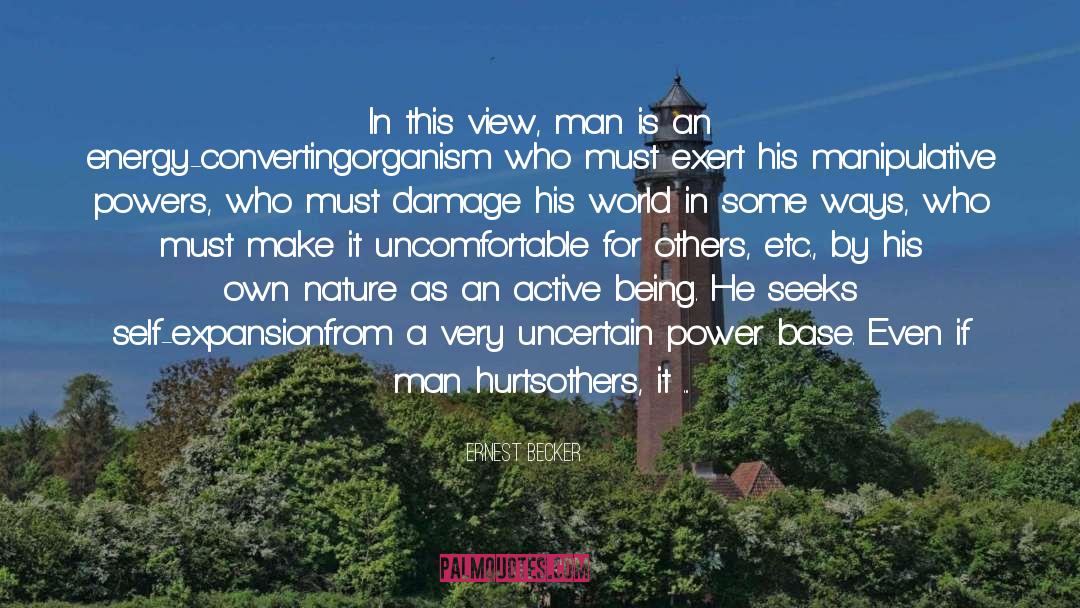
Love is the problem of an animal ...

Too much possibility is the attempt by the person to overvalue the powers of the symbolic self. It reflects the attempt to exaggerate one half of the human dualism at the expense of the other. In this sense, what we call schizophrenia is an attempt by the symbolic self to deny the limitations of the finite body; in doing so, the entire person is pulled off balance and destroyed. It is as though the freedom of creativity that stems from within the symbolic self cannot be contained by the body, and the person is torn apart. This is how we understand schizophrenia today, as the split of self and body, a split in which the self is unanchored, unlimited, not bound enough to everyday Things, not contained enough in dependable physical behavior.
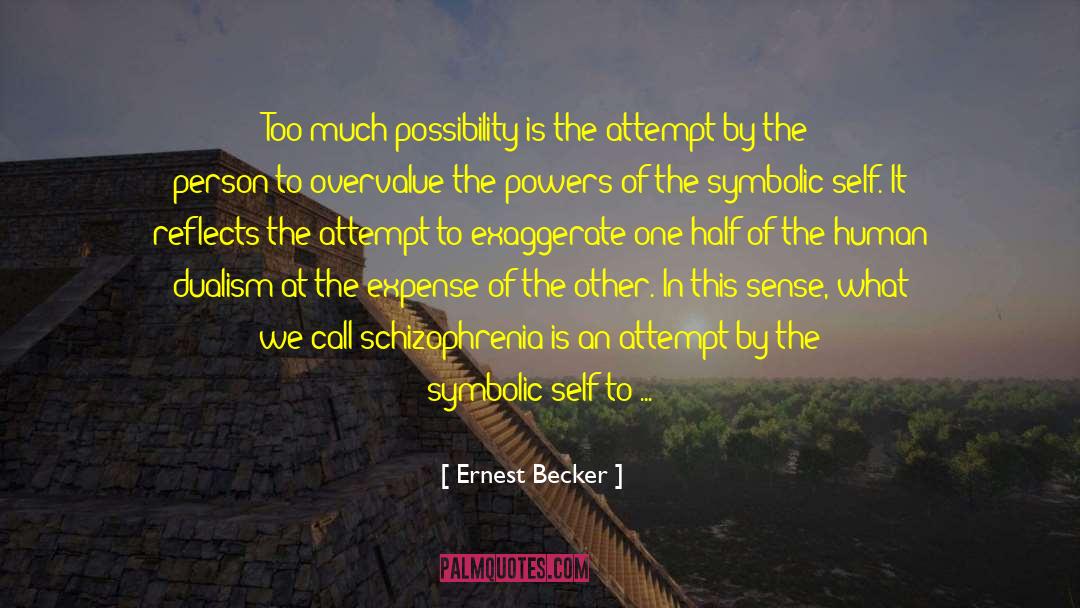
People create the reality they need in order to discover themselves

To grow up at all is to conceal the mass of internal scar tissue that throbs in our dreams.

Love is the problem of an animal who must find life, create a dialogue with nature in order to experience his own being.

We can conclude that a project as grand as the scientific-mythical construction of victory over human limitation is not something that can be programmed by science. Even more, it comes from the vital energies of masses of men sweating within the nightmare of creation-and it is not even in man's hands to program. Who knows what form the forward momentum of life will take in the time ahead or what use it will make of our anguished searching. The most that any one of us can seem to do is to fashion something-an object or ourselves-and drop it into the confusion, make an offering of it, so to speak, to the life force.

We are gods with anuses.

Man must always imagine and believe in a "second" reality or a better world than the one that is given him by nature.

...Erich Fromm wondered why most people did not become insane in the face of the existential contradiction between a symbolic self, that seems to give man infinite worth in a timeless scheme of things, and a body that is worth about 98¢.

If the love object is divine perfection, then one's own self is elevated by joining one's destiny to it ... All our guilt, fear, and even our mortality itself can be purged in a perfect consummation with perfection itself.

As Rank put it, man yearns for a "feeling of kinship with the All." He wants to be "delivered from his isolation" and become "part of a greater and higher whole." The person reaches out naturally for a self beyond his own self in order to know who he is at all, in order to feel that he belongs in the universe. Long before Camus penned the words of the epigraph of this chapter, Rank said: "For only by living in close union with a god-ideal that has been erected outside one's own ego is one able to live at all.

All power is in essence power to deny mortality.
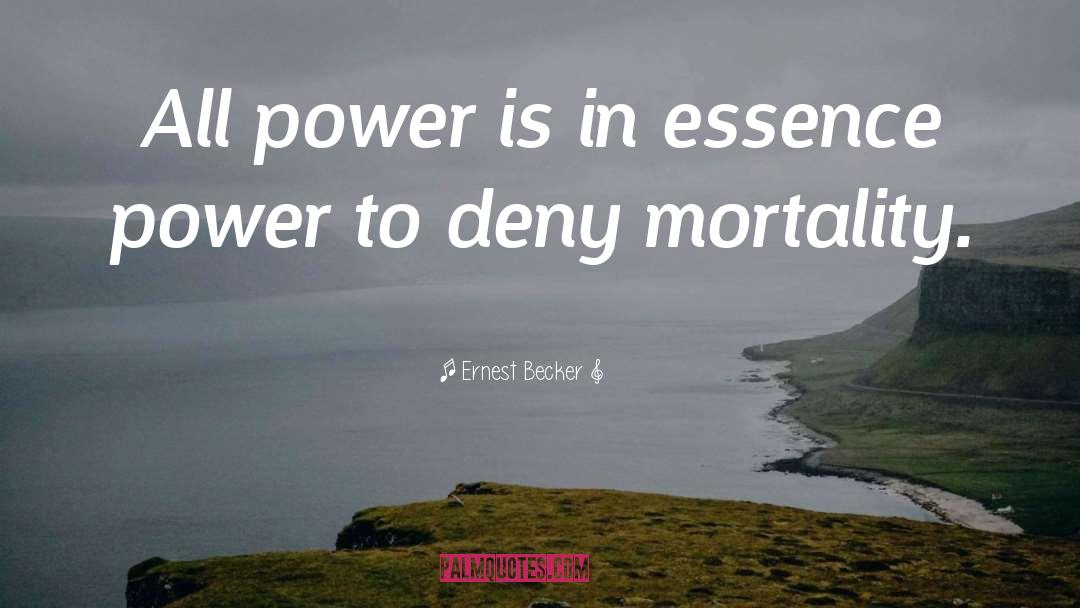
The great boon of repression is that it makes it possible to live decisively in an overwhelmingly miraculous and incomprehensible world, a world so full of beauty, majesty, and terror that if animals perceived it all they would be paralyzed to act ... What would the average man (sic) do with a full consciousness of absurdity? He has fashioned his character for the precise purpose of putting it between himself and the facts of life; it is his special tour-de-force that allows him to ignore incongruities, to nourish himself on impossibilities, to thrive on blindness. He accomplishes thereby a peculiarly human victory: the ability to be smug about terror.
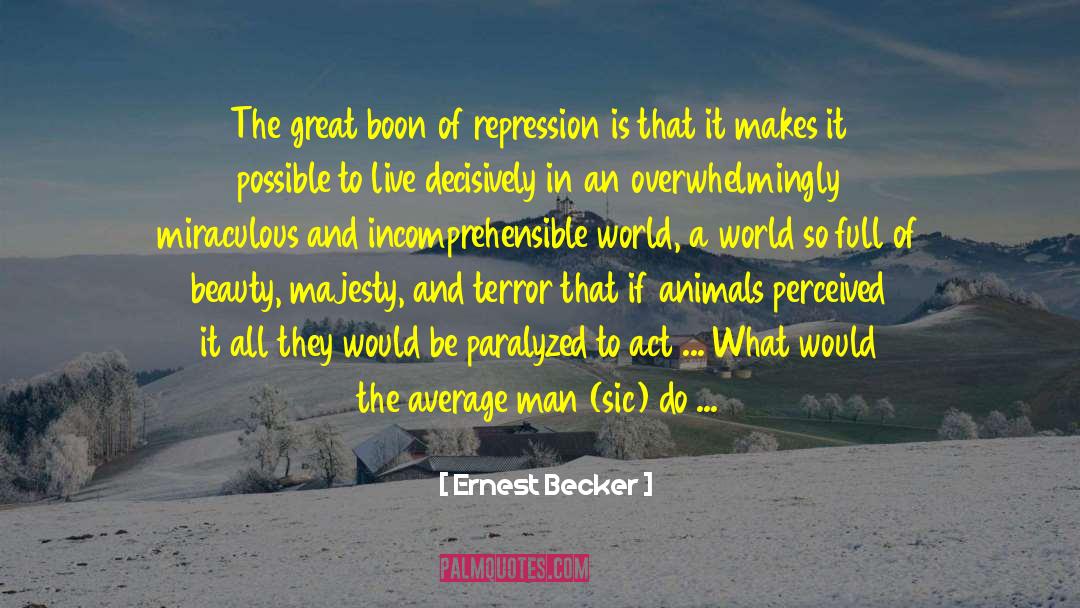
The "healthy" person, the true individual, the self-realized soul, the "real" man, is the one who has transcended himself.

The neurotic opts out of life because he is having trouble maintaining his illusions about it, which proves nothing less than that life is possible only with illusions.
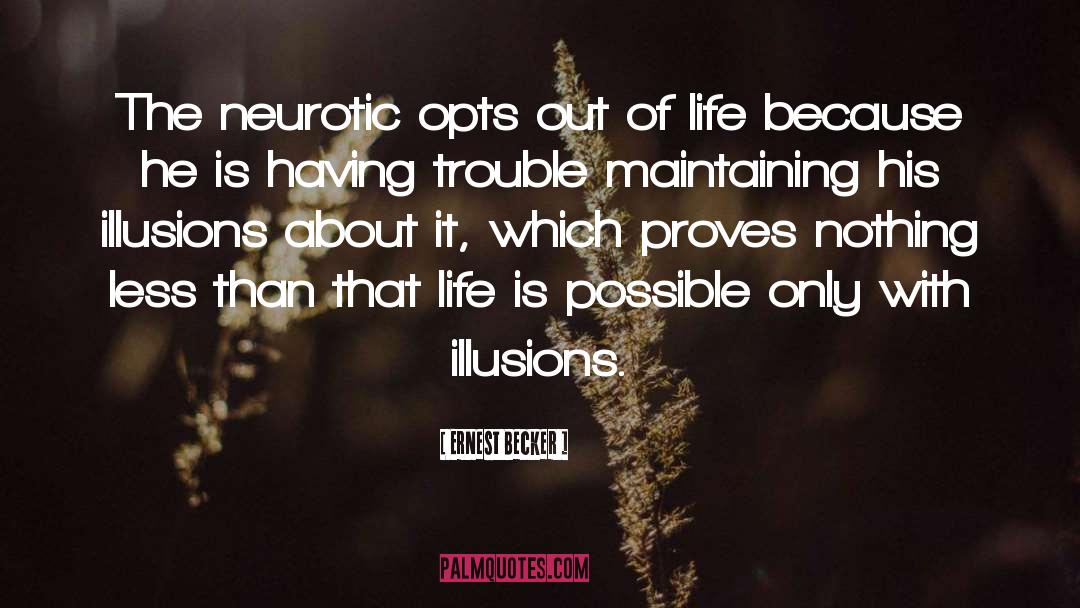
Relationship is thus always slavery of a kind, which leaves a residue of guilt.
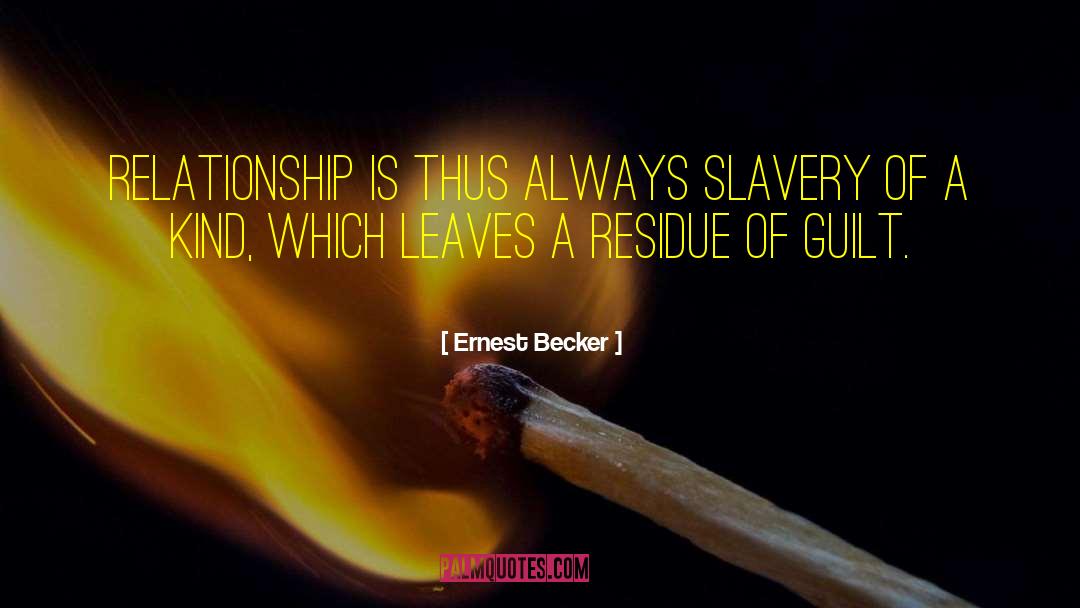
The greatest cause of evil included all human motives in one giant paradox. Good and bad were so inextricably mixed that we couldn't make them out; bad seemed to lead to good, and good motives led to bad. The paradox is that evil comes from man's urge to heroic victory over evil.
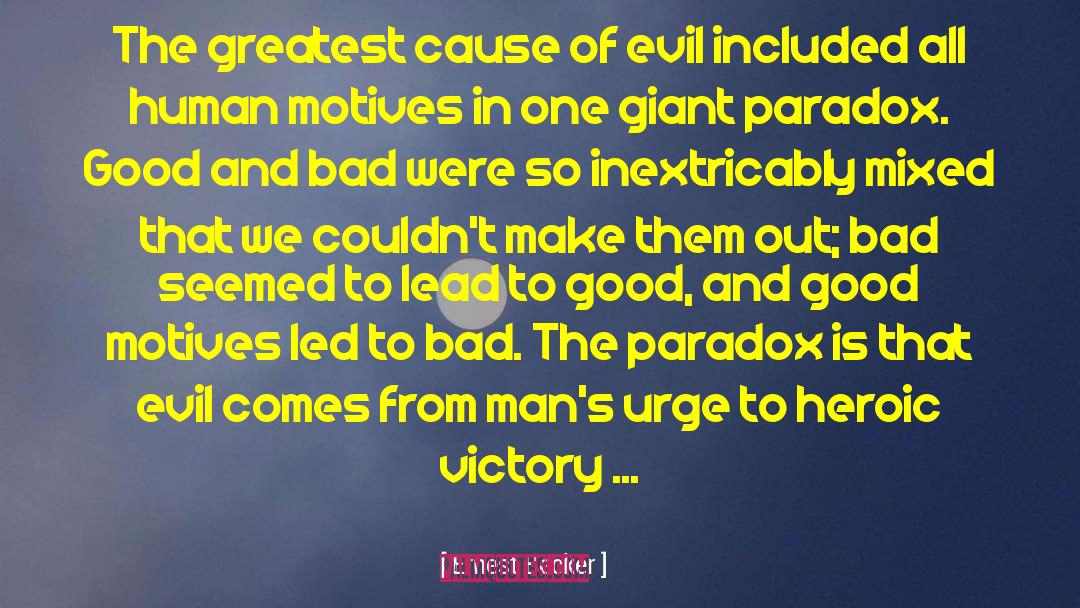
Kierkegaard gives us some portrait sketches of the styles of denying possibility, or the lies of character-which is the same thing. He is intent on describing what we today call "inauthentic" men, men who avoid developing their own uniqueness; they follow out the styles of automatic and uncritical living in which they were conditioned as children. They are "inauthentic" in that they do not belong to themselves, are not "their own" person, do not act from their own center, do not see reality on its terms; they are the one-dimensional men totally immersed in the fictional games being played in their society, unable to transcend their social conditioning: the corporation men in the West, the bureaucrats in the East, the tribal men locked up in tradition-man everywhere who doesn't understand what it means to think for himself and who, if he did, would shrink back at the idea of such audacity and exposure.
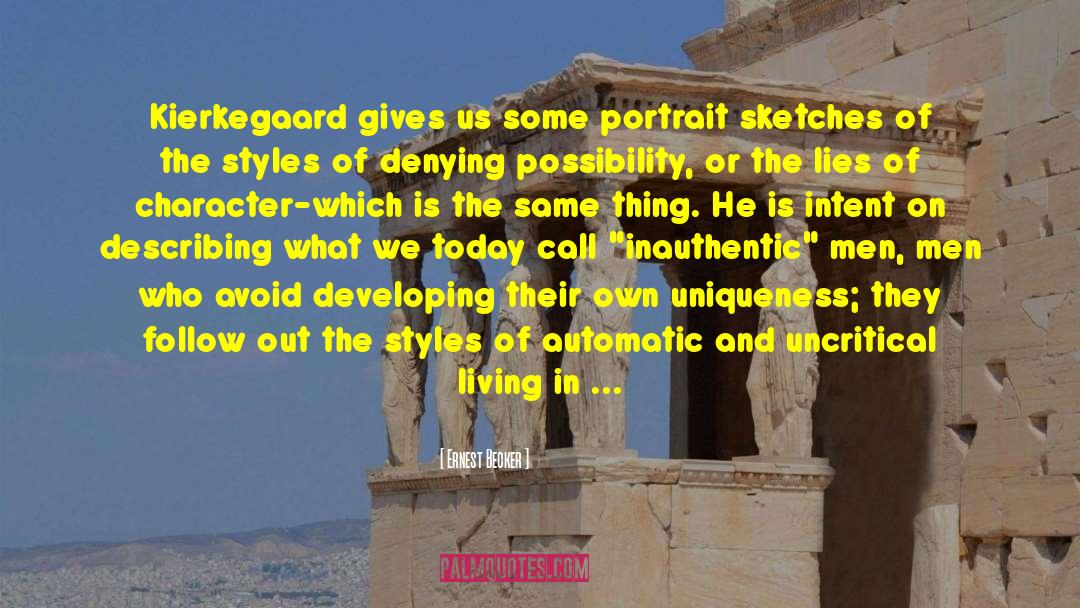
In seeking to avoid evil, humanity is responsible for bringing more evil into the world than organisms could ever do merely by exercising their digestive tracts. It is our ingenuity, rather than our animal nature, that has given our fellow creatures such a bitter earthly fate.

Man is naturally humble, naturally grateful, naturally guilty, naturally transcended, naturally a sufferer; he is small, pitiful, weak, a passive taker who tucks himself naturally in a beyond of superior, awesome, all-embracing power.

Freud has said in Totem and Taboo that acts that are illegal for the individual can be justified in another way: the one who initiates the act takes upon himself both the risk and the guilt. The result is truly magic: each member of the group can repeat the act without guilt. They are not responsible, only the leader is. Redl calls this, aptly, "priority magic." But it does something even more than relieve guilt: it actually transforms the fact of murder. This crucial point initiates us directly into the phenomenology of group transformation of the everyday world. If one murders without guilt, and in imitation of the hero who runs the risk, why then it is no longer murder: it is "holy aggression. For the first one it was not." In other words, participation in the group redistills everyday reality and gives it the aura of the sacred-just as, in childhood, play created a heightened reality.

We consult astrology charts like the Babylonians, try to make our children into our own image with a firm hand like the Romans, elbow others to get a breath-quickening glimpse of the queen in her ritual procession, and confess to the priests and attend church. And we wonder why, with all this power capital drawn from so many sources, we are deeply anxious about the meaning of our lives. The reason is plain enough: none of these, nor all of them taken together, represents an integrated world conception into which we fit ourselves with pure belief and trust.
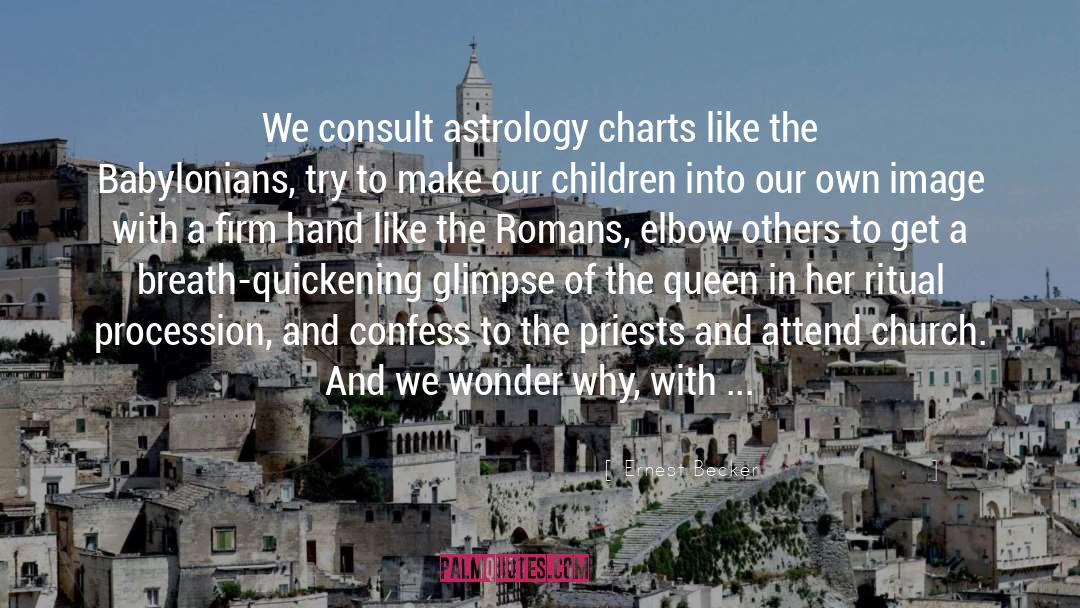
Man has a mind that soars out to speculate about atoms and infinity, who can place himself imaginatively at a point in space and contemplate bemusedly his own planet. This immense expansion, this dexterity, this ethereality, this self-consciousness gives to man literally the status of a small god in nature ... Yet, at the same time ... man is a worm and food for worms
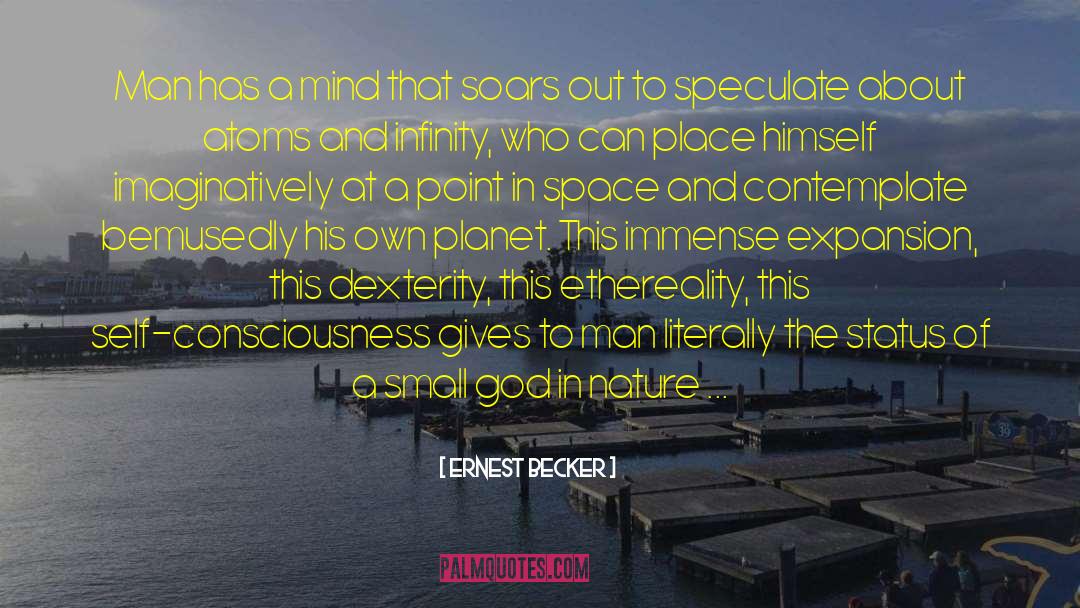
What does it mean to be a self-conscious animal? The idea is ludicrous, if it is not monstrous. It means to know that one is food for worms.
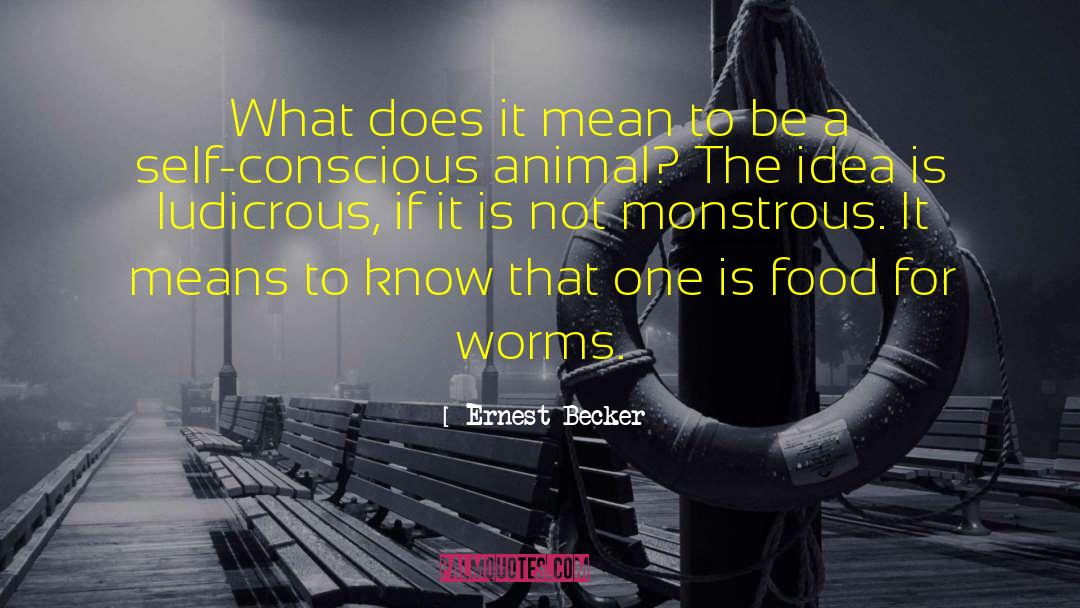
Modern man is drinking and drugging himself out of awareness, or he spends his time shopping, which is the same thing.
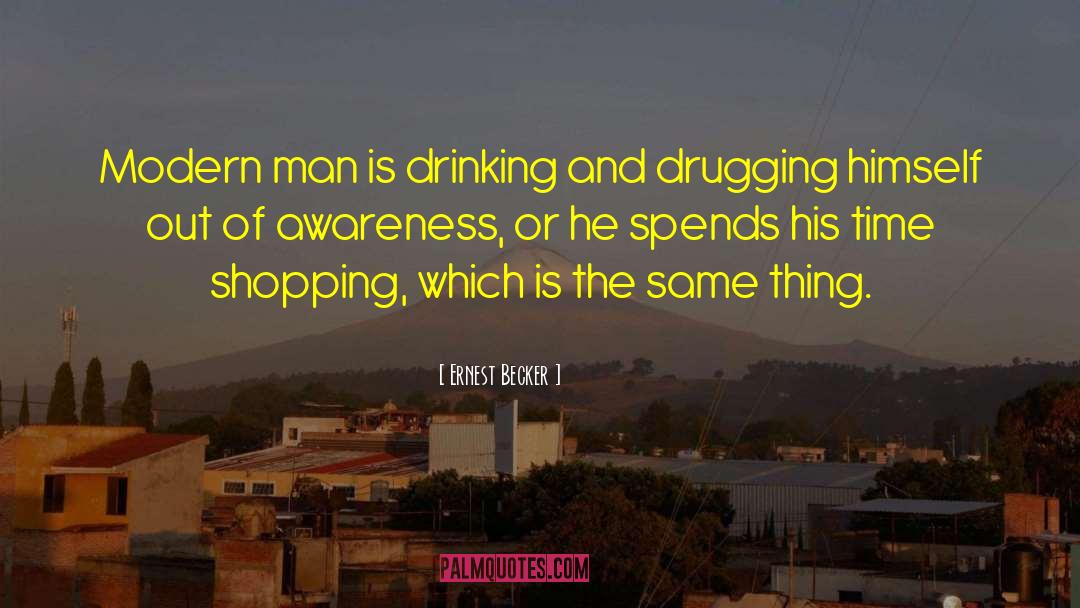
We might say that psychoanalysis revealed to us the complex penalties of denying the truth of man's condition, what we might call the costs of pretending not to be mad.
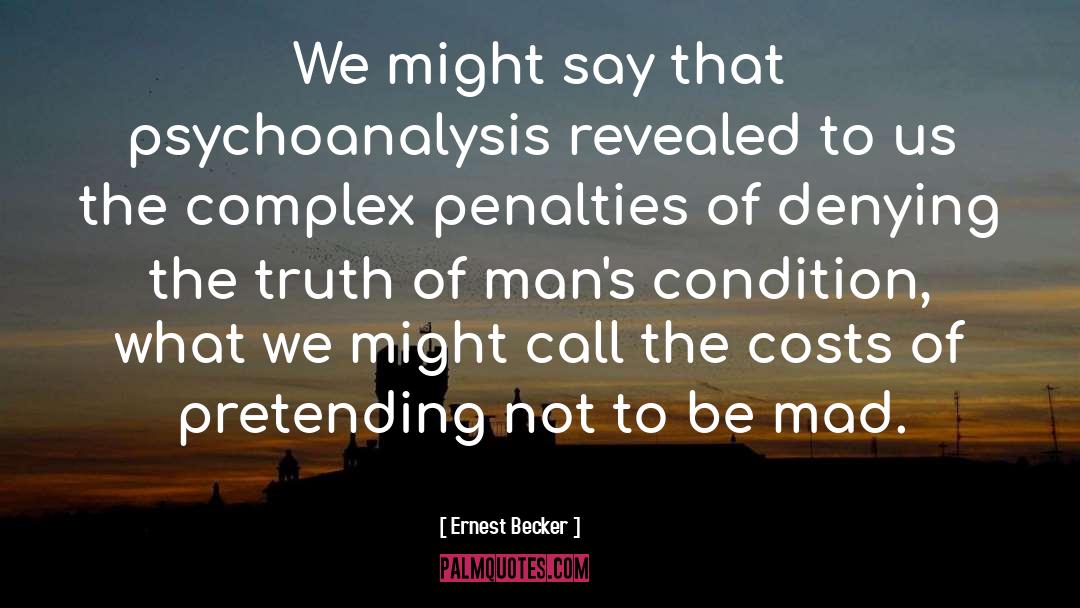
The self must be destroyed, brought down to nothing, in order for self-transcendence to begin. Then the self can begin to relate itself to powers beyond itself. It has to thrash around in its finitude, it has to "die," in order to question that finitude, in order to see beyond it. To what? Kierkegaard answers: to infinitude, to absolute transcendence, the the Ultimate Power of Creation which made finite creatures.
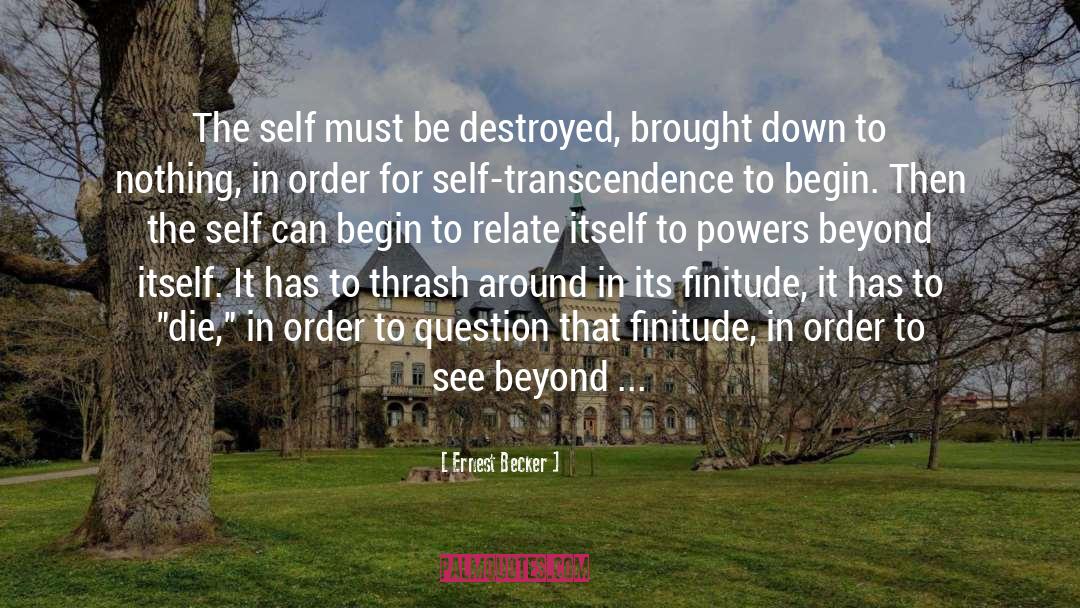
It begins to look as though modern man cannot find his heroism in everyday life any more, as men did in traditional societies just by doing their daily duty of raising children, working, and worshiping. He needs revolutions and wars and "continuing" revolutions to last when the revolutions and wars end. That is the price modern man pays for the eclipse of the sacred dimension. When he dethroned the ideas of soul and God he was thrown back hopelessly on his own resources, on himself and those few around him. Even lovers and families trap and disillusion us because they are not substitutes for absolute transcendence. We might say that they are poor illusions in the sense that we have been discussing.
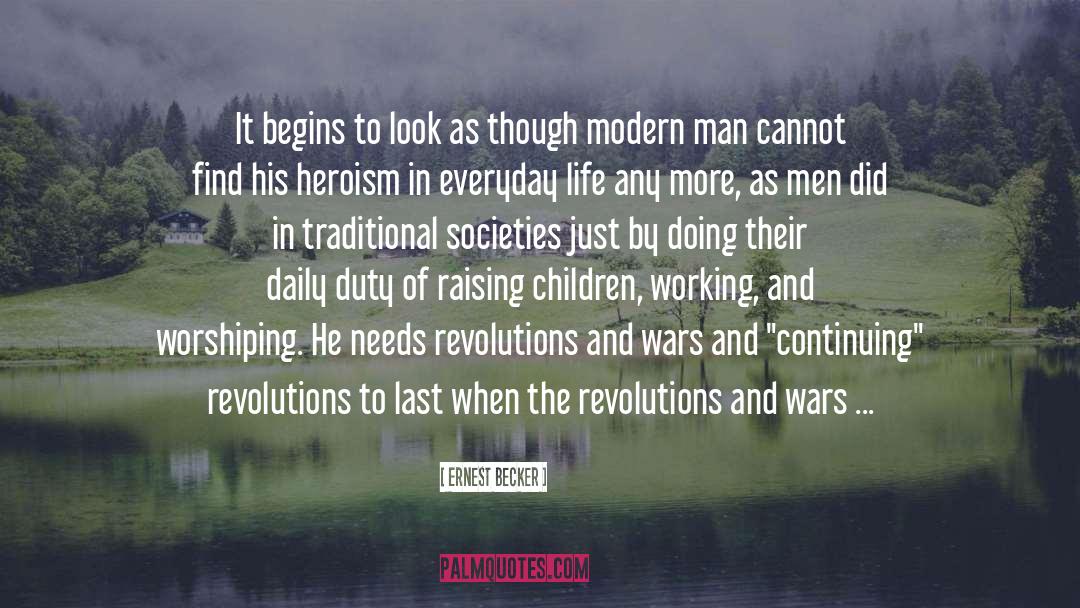
Each society is a hero system which promises victory over evil and death.

But now the rub for man. If sex is a fulfillment of his role as an animal in the species, it reminds him that he is nothing himself but a link in the chain of being, exchangeable with any other and completely expendable in himself. Sex represents, then, species consciousness and, as such, the defeat of individuality, of personality. But it is just this personality that man wants to develop: the idea of himself as a special cosmic hero with special gifts for the universe. He doesn't want to be a mere fornicating animal like any other-this is not a truly human meaning, a truly distinctive contribution to world life. From the very beginning, then, the sexual act represents a double negation: by physical death and of distinctive personal gifts. This point is crucial because it explains why sexual taboos have been at the heart of human society since the very beginning. They affirm the triumph of human personality over animal sameness. With the complex codes for sexual self-denial, man was able to impose the cultural map for personal immortality over the animal body. He brought sexual taboos into being because he needed to triumph over the body, and he sacrificed the pleasures of the body to the highest pleasure of all: self-perpetuation as a spiritual being through all eternity. This is the substitution that Roheim was really describing when he made his penetrating observation on the Australian aborigines: "The repression and sublimation of the primal scene is at the bottom of tot
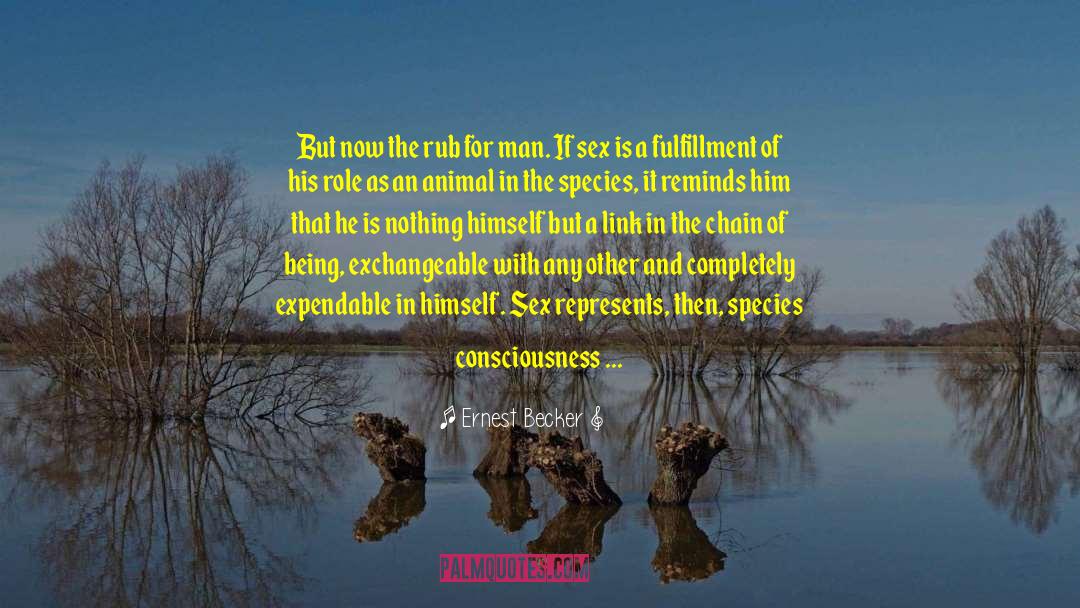
The road to creativity passes so close to the madhouse and often detours or ends there.
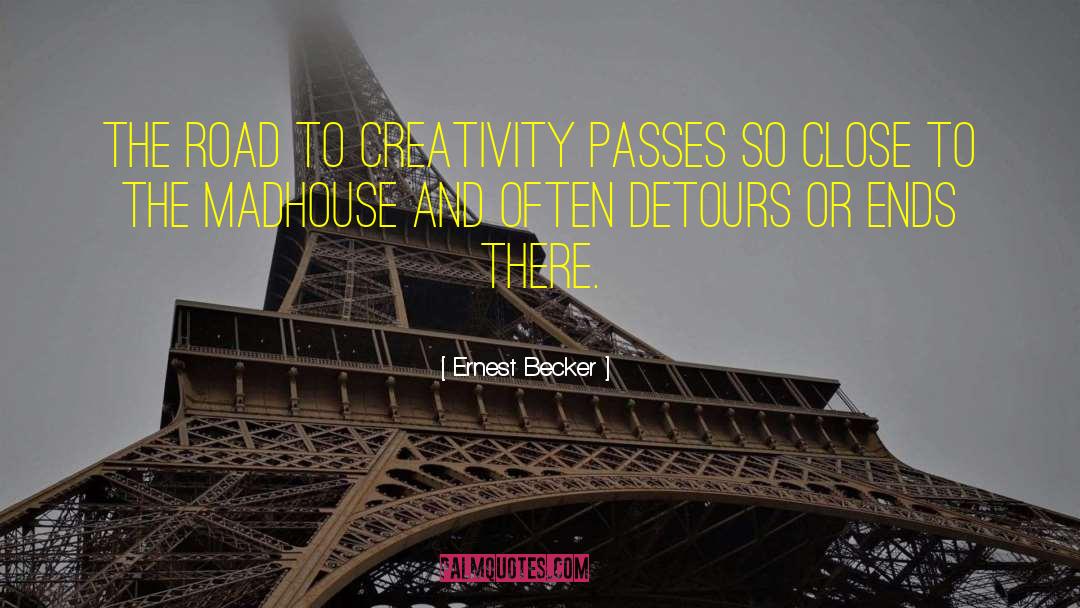
Man's natural and inevitable urge to deny mortality and achieve a heroic self-image are the root causes of human evil.
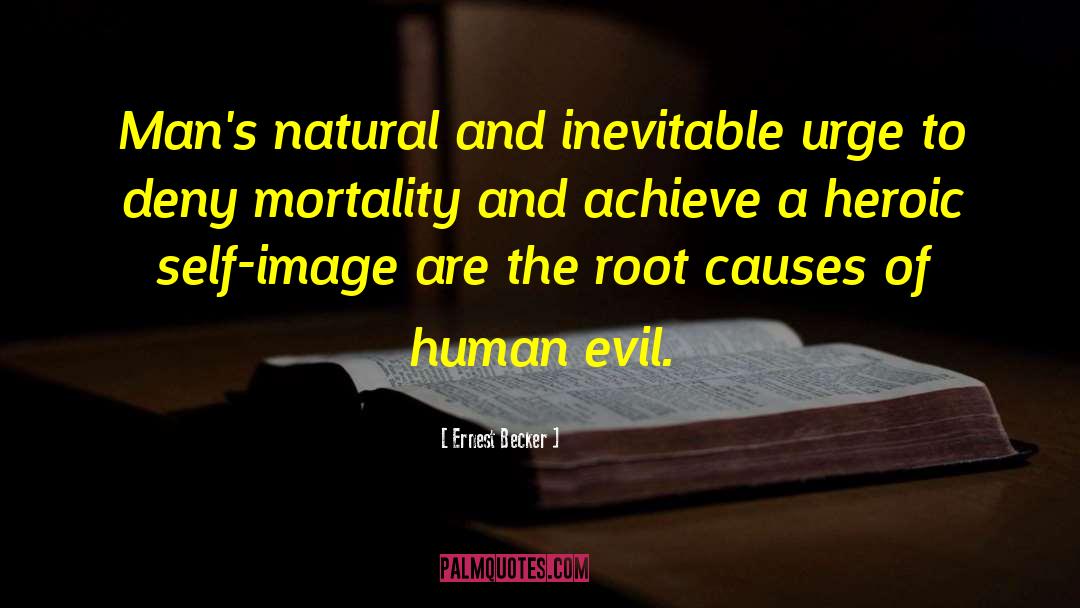
We admire Freud for his serious dedication, his willingness to retract, the stylistic tentativeness of some of his assertions, his lifelong review of his pet notions. We admire him for his very deviousness, his hedging,s and his misgivings, because they seem to make him more of an honest scientist, reflecting truthfully the infinite manifold of reality. But this is to admire him for the wrong reason. A basic cause for his own lifelong twistings was that he would never cleanly leave the sexual dogma, never clearly see or admit that the terror of death was the basic repression.
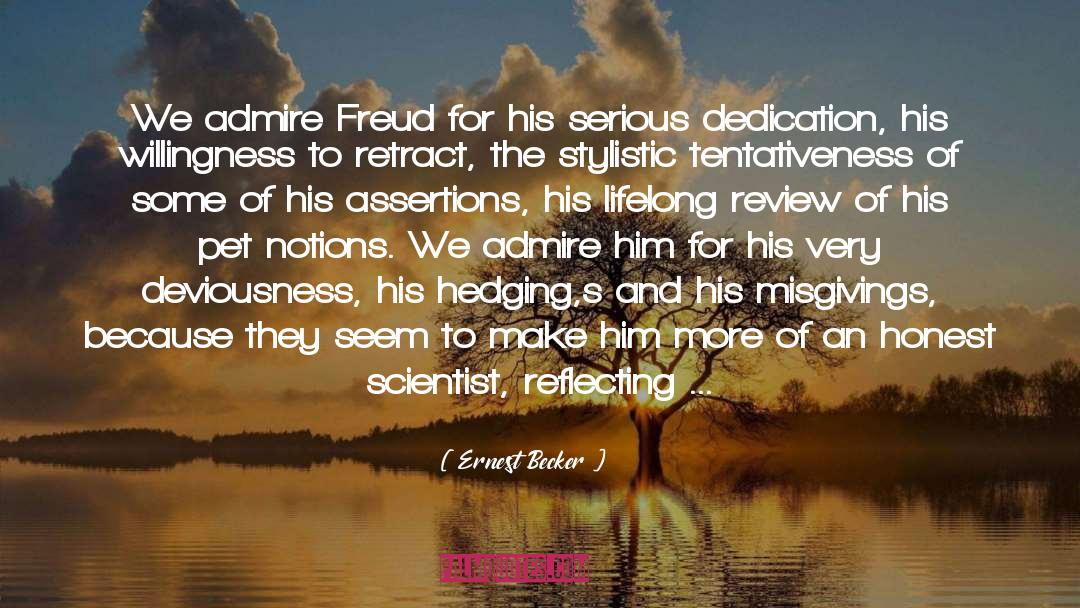
The thing that has to be explained in human relations is precisely the fascination of the person who holds or symbolizes power. There is something about him that seems to radiate out to others and to melt them into his aura, a "fascinating effect," as Christine Olden called it, of "the narcissistic personality"3 or, as Jung preferred to call him, the "mana-personality.
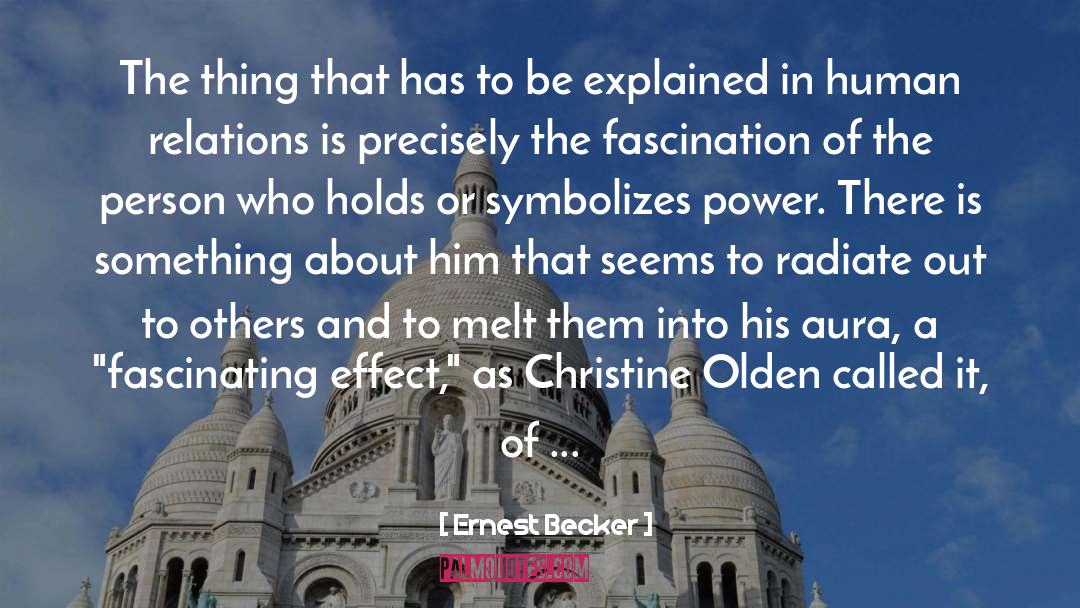
The real world is simply too terrible to admit.
it tells man that he is a small trembling animal who will someday decay and die.
Culture changes all of this,makes man seem important,vital to the universe.
immortal in some ways
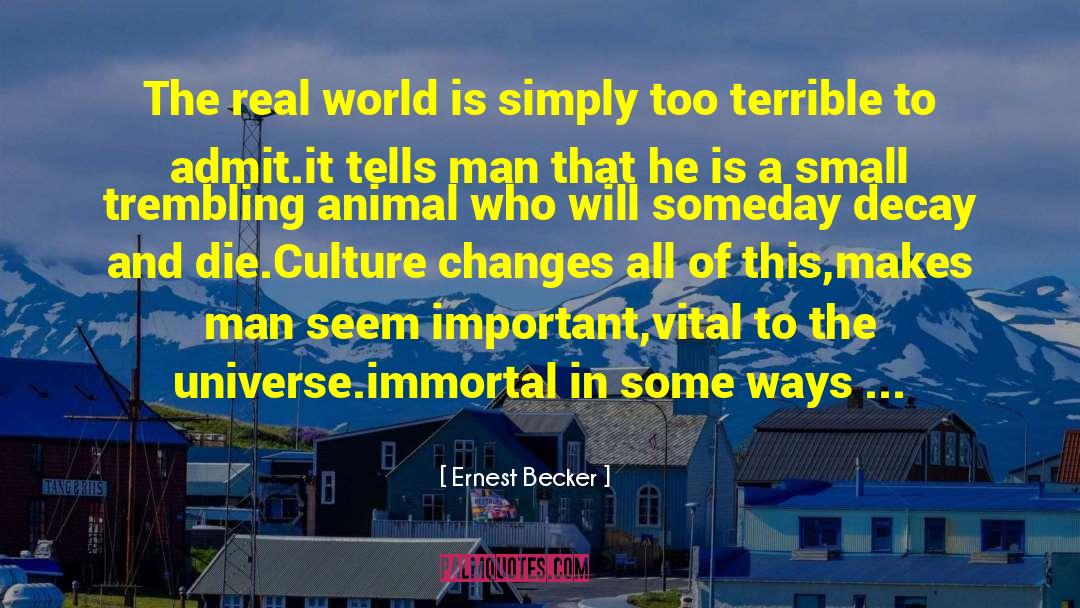
In the neurotic in whom one sees the collapse of the whole human ideology of God it has also become obvious what this signifies psychologically. This was not explained by Freud's psychoanalysis which only comprehended the destructive process in the patient from his personal history without considering the cultural development which bred this type.
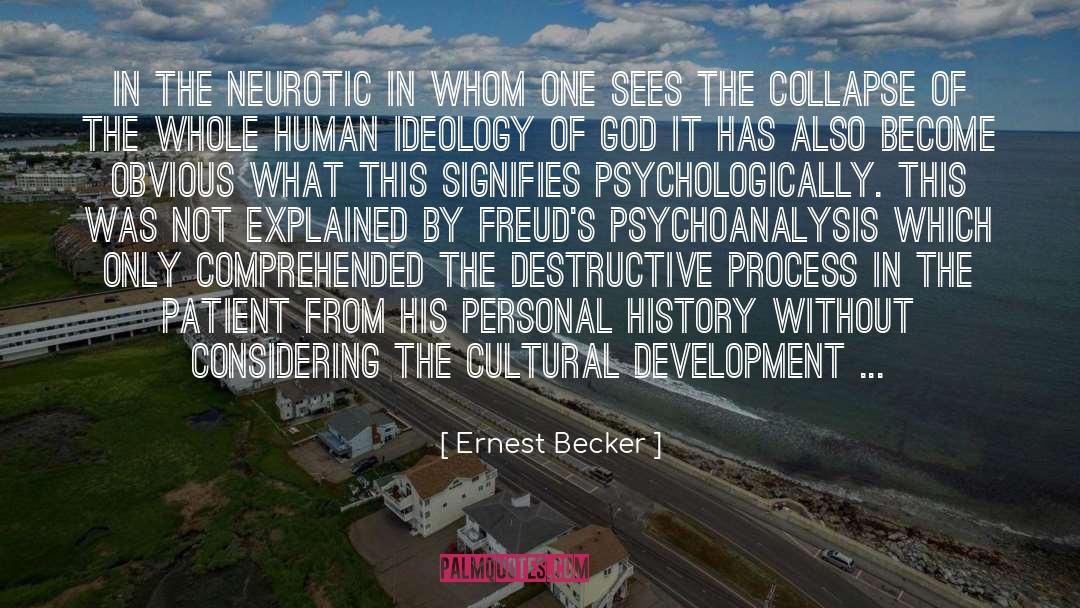
But now the problem of the causa-sui project of the genius. In the normal Oedipal project the person internalizes the parents and the superego they embody, that is, the culture at large. But the genius cannot do this because his project is unique; it cannot be filled up by the parents or the culture. It is created specifically by a renunciation of the parents, a renunciation of what they represent and even of their own concrete persons-at least in fantasy-as there doesn't seem to be anything in them that has caused the genius. Here we see whence the genius gets his extra burden of guilt: he has renounced the father both spiritually and physically. This act gives him extra anxiety because now he is vulnerable in his turn, as he has no one to stand on. He is alone in his freedom. Guilt is a function of fear, as Rank said.

What, actually, does it mean to be a tragic figure firmly in the grip of one's daimon? It means to possess great talent, to relentlessly pursue the expression of that talent through the unswerving affirmation of the causa-sui project that alone gives it birth and form. One is consumed by what he must do to express his gift. The passion of his character becomes inseparable from his dogma. Jung says the same thing beautifully when he concludes that Freud "must himself be so profoundly affected by the power of Eros that he actually wished to elevate it into a dogma...like a religious numen."
Eros is precisely the natural energy of the child's organism that will not let him rest, that keeps propelling him forward in a driven way while he fashions the lie of his character-which ironically permits that very drivenness to continue, but now under the illusion of self-control.

Erwin Strauss, in his brilliant monograph on obsession, similarly earlier showed how repulsed Swift was by the animality of the body, by its dirt and decay. Straus pronounced a more clinical judgment on Swift's disgust, seeing it as part of the typical obsessive's worldview: "For all obsessives sex is severed from unification and procreation....Through the...isolation of the genitals from the whole of the body, sexual functions are experienced as excretions and as decay." This degree of fragmentation is extreme, but we all see the world through obsessive eyes at least part of the time and to some degree; and as Freud said, not only neurotics take exception to the fact that "we are born between urine and feces." In t his horror of the incongruity of man Swift the poet gives more tormented voice to the dilemma that haunts us all, and it is worth summing it up one final time: Excreting is the curse that threatens madness because it shows man his abject finitude, his physicalness, the likely unreality of his hopes and dreams. But even more immediately, it represents man's utter bafflement at the sheer non-sense of creation: to fashion the sublime miracle of the human face, the mysterium tremendum of radiant female beauty, the veritable goddesses that beautiful women are; to bring this out of nothing, out of the void, and make it shine in noonday; to take such a miracle and put miracles again within it, deep in the mystery of eyes that peer out-the eye that gave even the dry Darwi
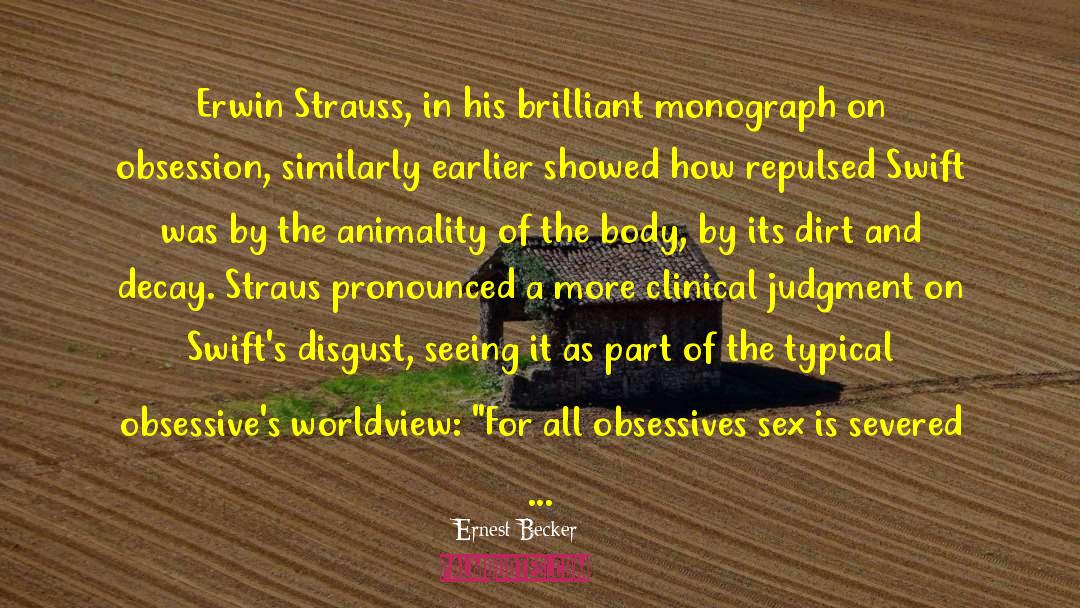
Why does man accept to live a trivial life? Because of the danger of a full horizon of experience, of course. This is the deeper motivation of philistinism, that it celebrates the triumph over possibility, over freedom. Philistinism knows its real enemy: freedom is dangerous. If you follow it too willingly it threatens to pull you into the air; if you give it up too wholly, you become a prisoner of necessity. The safest thing is to toe the mark of what is socially possible.
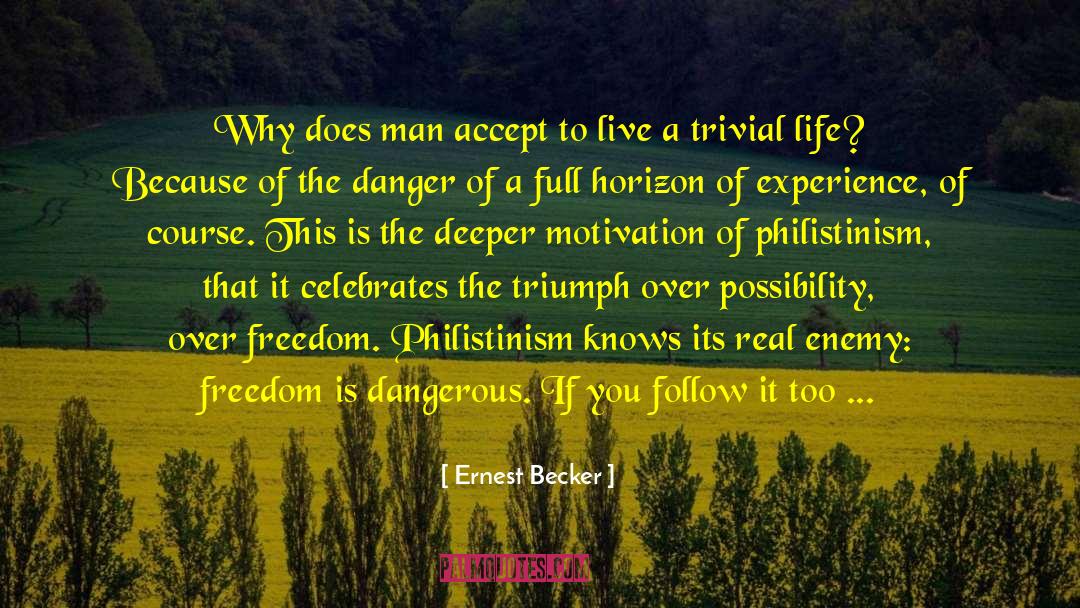
The crisis of modern society is precisely that the youth no longer feel heroic in the plan for action that their culture has set up. They don't believe it is empirically true to the problems of their lives and times.

Human life may not be more than a meaningless interlude in a vicious drama of flesh and bones that we call evolution; that the Creator may not care any more for the destiny of man or the self-perpetuation of individual men than He seems to have cared for the dinosaurs or the Tasmanians.
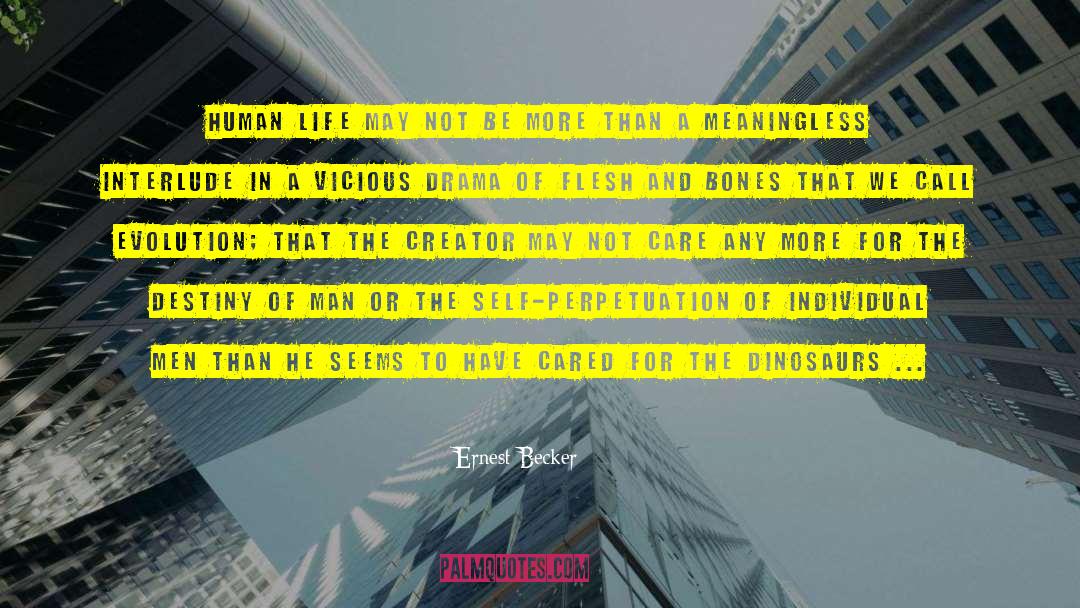
What is the ideal for mental health, then? A lived, compelling illusion that does not lie about life, death, and reality; one honest enough to follow its own commandments: I mean, not to kill, not to take the lives of others to justify itself.

Rank asked why the artist so often avoids clinical neurosis when he is so much a candidate for it because of his vivid imagination, his openness to the finest and broadest aspects of experience, his isolation from the cultural world-view that satisfies everyone else. The answer is that he takes in the world, but instead of being oppressed by it he reworks it in his own personality and recreates it in the work of art. The neurotic is precisely the one who cannot create - the "artiste-manque," as Rank so aptly called him. We might say that both the artist and the neurotic bite off more than they can chew, but the artist spews it back out again and chews it over in an objectified way, as an external, active, work project. The neurotic can't marshal this creative response embodied in a specific work, and so he chokes on his introversions. The artist has similar large-scale introversions, but he uses them as material.

If there is tragic limitation in life there is also possibility. What we call maturity is the ability to see the two in some kind of balance into which we can fit creatively.

It is impossible to get blood from a stone, to get spirituality from a physical being.
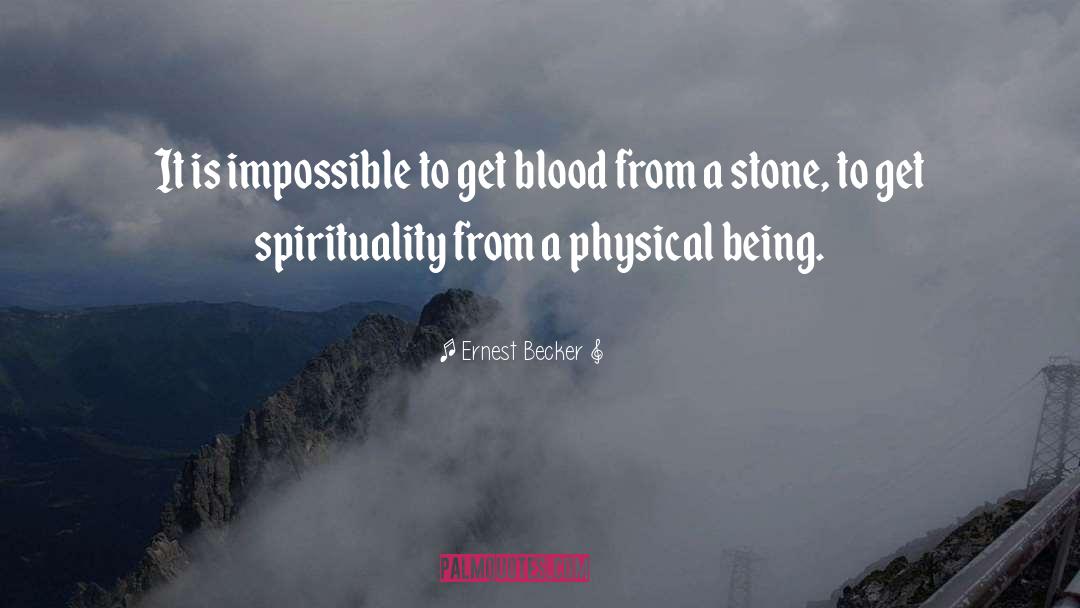
We might say that both the artist and the neurotic bite off more than they can chew, but the artist spews it back out again and chews it over in an objectified way, as an external, active work project

He was my date. I got a massage, and I must have taken five aspirins to calm myself down. In the restaurant, I saw him from across the room, and I got such butterflies in my stomach and such a thing that went from head to toe. He had like a halo around his head of stars to me. He projected something I have never seen in my life ... . when I'm with him I'm in awe, and I don't know why I can't snap out of it ... . I can't think. He's so fascinating ... .

[Man] literally drives himself into a blind obliviousness with social games, psychological tricks, personal preoccupations so far removed from the reality of his situation that they are forms of madness, but madness all the same.
![Ernest Becker Quotes: [Man] literally drives himself into Ernest Becker Quotes: [Man] literally drives himself into](https://palmquotes.com/author/ernest-becker-quotes-821548.jpg)
Modern man's dependency on the love partner, then, is a result of the loss of spiritual ideologies, just as is his dependency on his parents or on his psychotherapist. He needs somebody, some "individual ideology of justification" to replace the declining "collective ideologies." Sexuality, which Freud thought was at the heart of the Oedipus complex, is now understood for what it really is: another twisting and turning, a groping for the meaning of one's life. If you don't have a God in heaven, an invisible dimension that justifies the visible one, then you take what is nearest at hand and work out your problems on that.
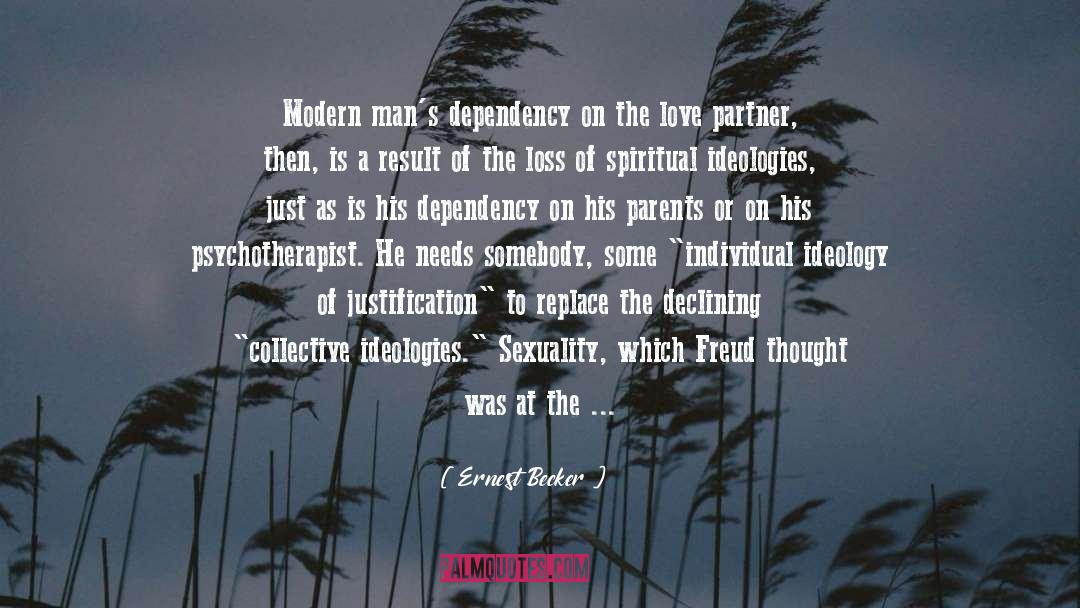
What do we mean by the lived truth of creation? We have to mean the world as it appears to men in a condition of relative unrepression; that is, as it would appear to creatures who assessed their true puniness in the face of the overwhelmingness and majesty of the universe, of the unspeakable miracle of even the single created object; as it probably appeared to the earliest men on the planet and to those extrasensitive types who have filled the roles of shaman, prophet, saint, poet, and artist. What is unique about their perception of reality is that it is alive to the panic inherent in creation: Sylvia Plath somewhere named God "King Panic." And Panic is fittingly King of the Grotesque. What are we to make of a creation in which the routine activity is for organisms to be tearing others apart with teeth of all types-biting, grinding flesh, plant stalks, bones between molars, pushing the pulp greedily down the gullet with delight, incorporating its essence into one's own organization, and then excreting with foul stench and gasses the residue. Everyone reaching out to incorporate others who are edible to him. The mosquitoes bloating themselves on blood, the maggots, the killerbees attacking with a fury and demonism, sharks continuing to tear and swallow while their own innards are being torn out-not to mention the daily dismemberment and slaughter in "natural" accidents of all types: the earthquake buries alive 70 thousand bodies in Peru, automobiles make a pyramid heap of ov

The best existential analysis of the human condition leads directly into the problems of God and faith
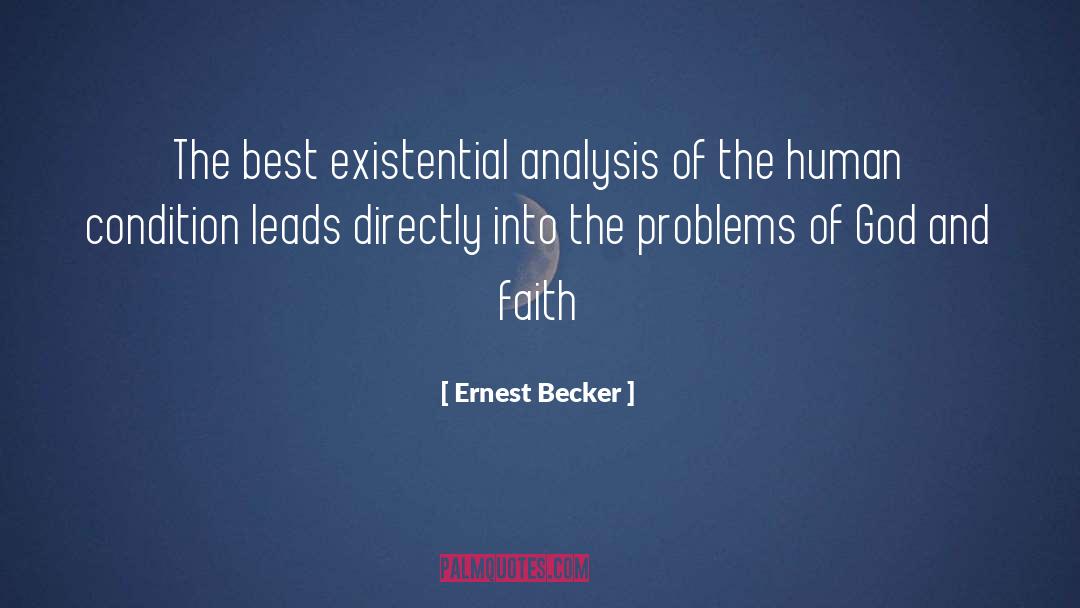
Sex is also a positive way of working on one's personal freedom project. After all, it is one of the few areas of real privacy that a person has in an existence that is almost wholly social, entirely shaped by the parents and society. In this sense, sex as a project represents a retreat from the standardizations and monopolizations of the social world. No wonder people dedicate themselves so all-consumingly to it, often from childhood on in the form of secret masturbations that represent a protest and a triumph of the personal self. As we will see in Part II of this book, Rang goes so far as to say that this use of sex explains all sexual conflicts in the individual-"from masturbation to the most varied perversions." The person attempts to use his sex in an entirely individual way in order to control it and relieve it of its determinism. It is as though one tried to transcend the body by depriving it entirely of its given character, to make sport and new invention in place of what nature "intended." The "perversions" of children certainly show this very clearly: they are the true artists of the body, using it as clay to assert their symbolic mastery. Freud saw this and recorded it as "polymorphous perversity"-which is one way of talking about it. But he seems not to have realized that this kind of play is already a very serious attempt to transcend determinism, not merely an animal search for a variety of body-zone pleasures.

He can even give his body over to the tribe, the state, the embracing magical umbrella of the elders and their symbols; that way it will no longer be a dangerous negation for him. But there is no real difference between a childish impossibility and an adult one; the only thing that the person achieves is a practiced self-deceit - what we call the "mature" character.
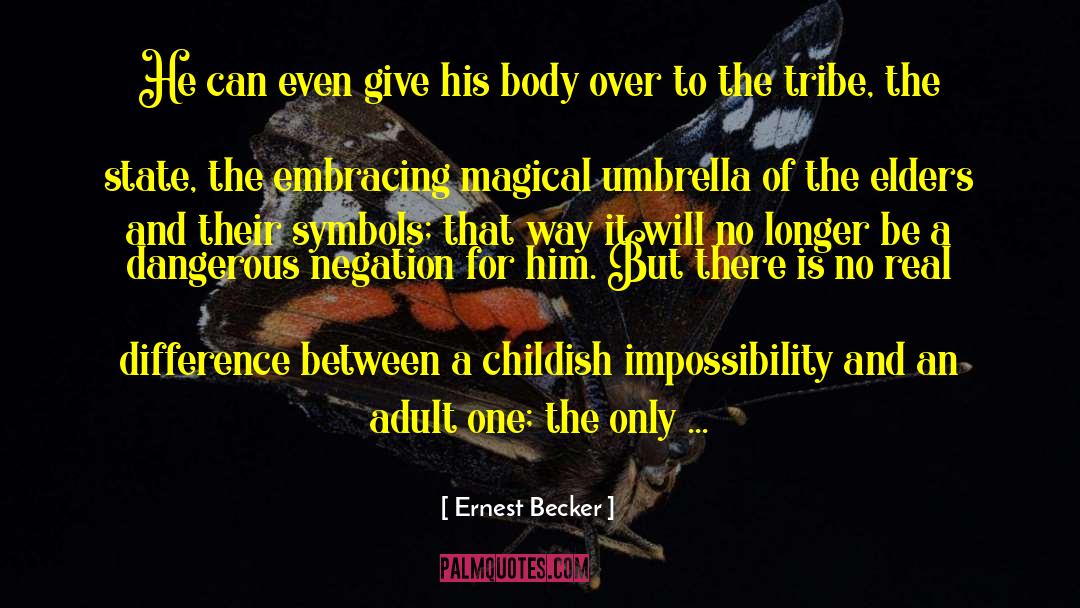
Now, what is unique about the child's perception of the world? For one thing, the extreme confusion of cause-and-effect relationships; for another, extreme unreality about the limits of his own powers. The child lives in a situation of utter dependence; and when his needs are met it must seem to him that he has magical powers, real omnipotence. If he experiences pain, hunger, or discomfort, all he has to do is to scream and he is relieved and lulled by gentle, loving sounds. He is a magician and a telepath who has only to mumble and to imagine and the world turns to his desires.
